





























Two years after a $700 million asset sale, Black Mountain Sand’s Rhett Bennett is deep into his next energy business. And 33 other stories from this year’s EOE class
Frank Dale • Kevin Lackey • Saam Zarrabi
Walter Kinzie • Rich Herbst • Mike Coffey
Derrick Potter • Darlene Boudreaux PLUS THESE 12 OTHER WINNERS

John Staab • Will & Leslie Bannister • Sunny Lowe

$50 MILLION GOAL
Debbie Cooley, founder and CEO of M-Pak, Inc., wants to quadruple sales in five years
Can you succeed in Fort Worth’s relationship-oriented culture? Five questions to ask yourself

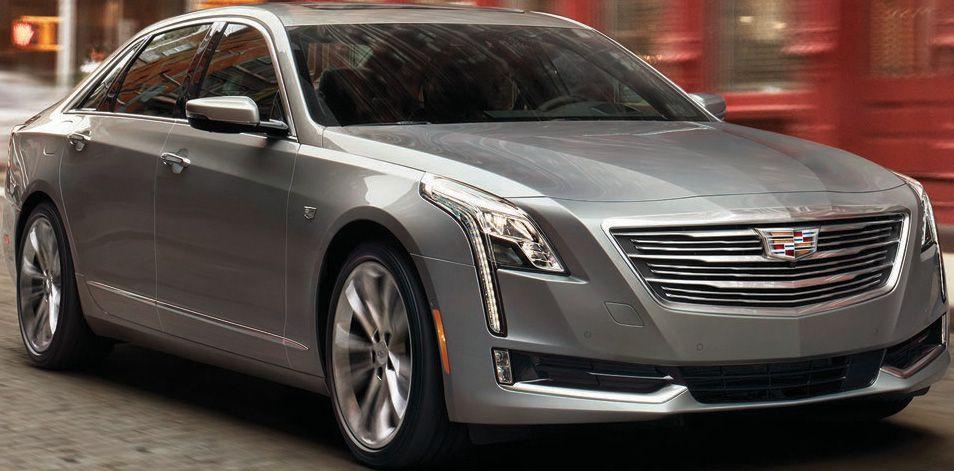

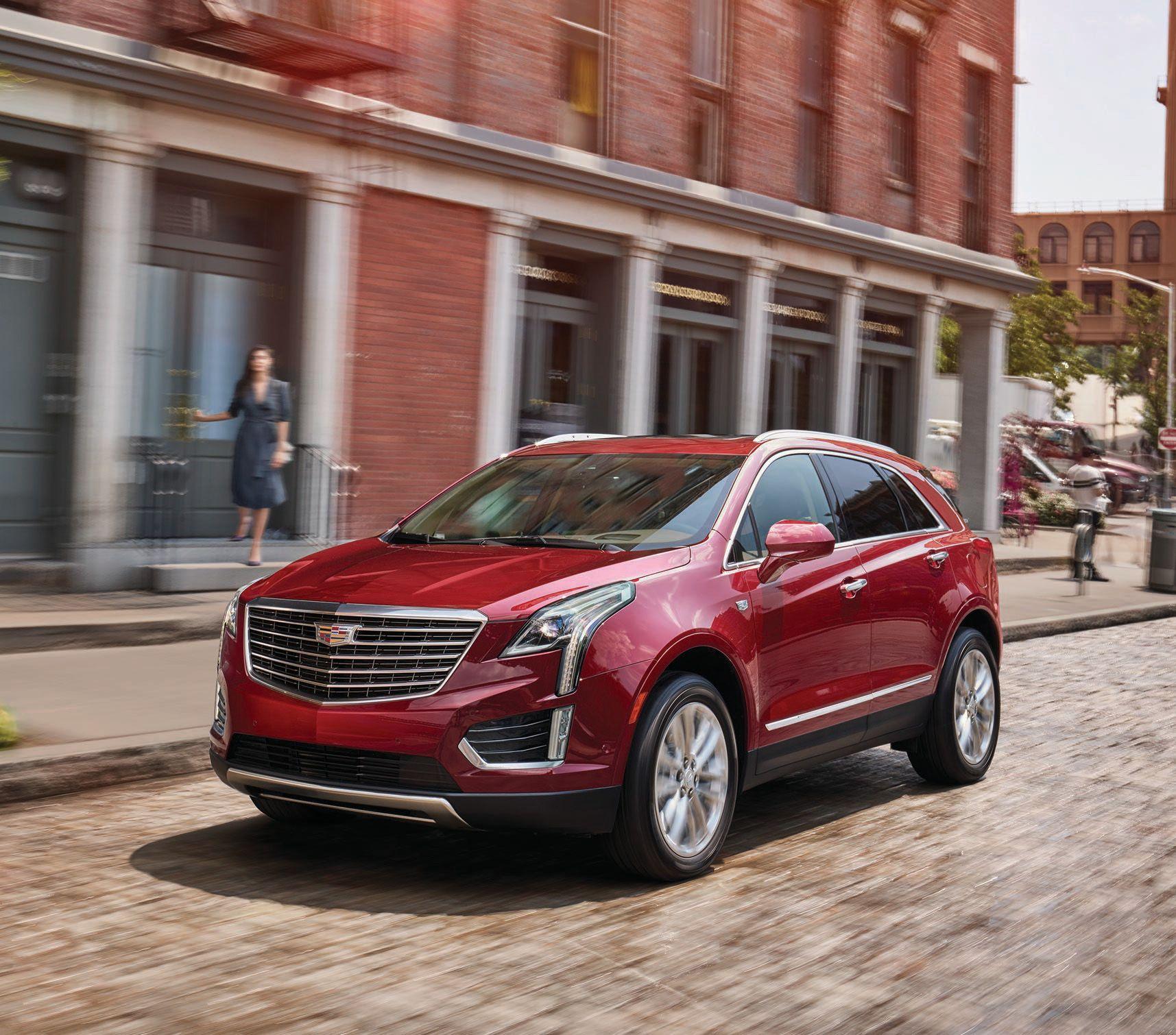



























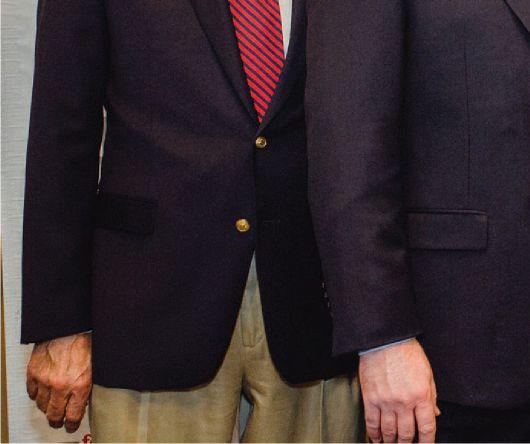




Whitley Penn is proud to be the presenting sponsor for Entrepreneur of Excellence Awards. This event showcases and honors entrepreneurial owners of private companies in the Greater Fort Worth area.








Learn more about how your company can leverage the power of experience at encorelive.com.
May / June 2019

Sure, company growth and big sales numbers are part of being an Entrepreneur of Excellence, but the success of each of these honorees is built on everything it took to get there. Here, the finalists — and winners — share their stories of overcoming adversity, rebounding from loss and giving back to the community, all defining what it truly means to be excellent.














6 Publisher’s Note
Bizz Buzz
9 Bizz Buzz: Trey Neville and Amber Calhoun, leasing agents for our Dream Office project, are building a budding real estate company on the Near Southside.
12 Face Time: RIDE TV ain’t horsin’ around.
Executive Life & Style
17 Distinctive Style: They call her “Boss Babe” for a reason.
20 Wine and Dine: Now these are what we call Entrées of Excellence.
26 Tech: Nifty office programs to make day-to-day tasks easier.
28 Office Space: Life comes full circle for the owner of Urbanology Designs, as the company opens a new office in an old North Richland Hills firehouse.
70 EO Spotlight: Debbie Cooley was once a reluctant entrepreneur; now, her business is looking to quadruple sales in the next five years.
74 Analyze This/FW Chamber Report: In a city with 80,000 businesses, the chamber has its eyes on the little guys.
76 Business Leadership/Successful Entrepreneurship: Are you an Entrepreneur of Excellence? Five questions to ask yourself.
80 Day in the Life: Softening in the housing market? Mary Margaret Davis doesn’t think so.

At Whitebox, we maintain complete transparency throughout the process, so you always know where you stand and what to expect next. The result is the best deal for you and your needs.
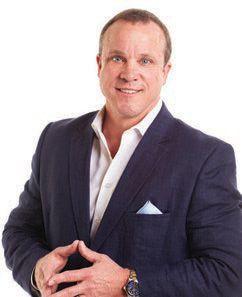
It is said that nothing is for sure except death and taxes. And, while I understand and accept that, my problem lies with someone else being in control of them.
In late 2017, my wife and I moved into a new home we built in southwest Fort Worth. And, while we were prepared for higher property taxes, we were nowhere close to being prepared for what was coming.
Having just arrived home from work in mid-March 2018, I walked out to my mailbox and noticed the much-anticipated Tarrant Appraisal District windowed-envelope. Two friends had recently completed homes in my development that were finished just a few months prior to mine, and I knew the appraised value that TAD had given them. So, I slowly opened the envelope. Any false sense of hope evaporated. Not only was the appraisal higher than I had anticipated, it was twice what I had anticipated.
After a week or two of hand-wringing, I contacted Mike Flynn with Southland Tax Consultants to file a protest. Homeowners can attempt to protest these appraisals themselves, but the costs of losing an appeal were too much to wing it on my own.
A few months later, the Tarrant Appraisal Review Board reduced the appraisal to only 28 percent higher than the value of my friends’ recently completed homes. The new appraisal document informed me that if I did not agree with the appraised value, I could sue TAD in District Court. The downside to suing TAD (outside of having to pay an attorney) is that if you lose, TAD can go back to the original value you first protested.
So, in early August, I hired Ed Cox with the Cox Law Firm to file suit against TAD. In January, just prior to having to go to court, Southland Tax and the Cox Law Firm accepted a settlement offer of just 2 percent above my two friends’ appraised home values. So, I won. Or did I really? I don’t mind paying property taxes. There is a need for them. Cities, municipalities, counties and school districts rely on them to raise money for their budgets. Local governments then use the money they collect from property taxes to help fund the many public services they provide. My issue is when TAD over-appraises the values of properties, knowing that many are just going to pay and not protest. (I have not yet received my 2019 appraisal.)
In our case, I’m convinced that the person or persons at TAD responsible for our appraisal simply pushed the wrong key. The alternative is to think they intentionally doubled the value of the appraisal knowing that we wouldn’t accept it, but that we would settle for more than the true value. I’m not sure which of the two bothers me more — the incompetence or the greed.

Hal A. Brown owner/publisher
76116. Volume 5, Number 3, May/June 2019. Basic Subscription price: $19.95 per year. Single copy price: $6.99 ©2019 Panther City Media Group. All rights reserved. No part of this publication may be reproduced without written permission from the publisher. how to contact us
For questions or comments, contact Scott Nishimura, executive editor, at 817.560.6111 or via email at snishimura@fwtexas.com.


































At Gus Bates Insurance, our clients rely on us to help guide them through the complex world of insurance and investments. But t before






Dream Office retail leasing agents Graham Ltd. dive into the city’s latest interesting project.
BY SCOTT NISHIMURA
Fort Worth Inc.’s Dream Office project is one of the latest leasing projects for the Graham Ltd. commercial real estate brokerage, led by partners Trey Neville, Amber Calhoun and David Duwe.
Graham, a retail specialist based in
the South Main Village on Fort Worth’s Near Southside, is handling retail leasing for the first floor of the Dream Office, a three-story, 22,000-square-foot building under construction in the West Side River District. Fort Capital is the developer, The Beck Group the architect, PRIM Construction the general contractor for
the core and shell, Reardon Construction the general contractor for the second- and third-floor tenant finish-outs, and Royer Commercial providing the common area furniture for the shared conference rooms, break areas and hallway furnishings.
The building has five signed office leases, with the largest tenant being Jet-
Stream Oil & Gas, Fort Capital said.
To fill the 5,000-square-foot, first-floor retail space, Fort Capital and Graham are looking for tenants that would serve first as amenities to the tenants, such as a coffee shop or wine bar, Calhoun says. “We’re working a deal now on half of the retail space,” she said.
Graham is working on plans for the Near Southside Mercantile-Phase 2 at 1201 Eighth Ave. at Mistletoe Boulevard. The 22,000-square-foot building will have retail, restaurant and office space on the first floor. The third and fourth floors will have 15 self-catering hotel rooms with tentative rack rates of $239 per night.
The building also will have a 5,300-square-foot second-floor events center. “Just trying to do something we don’t have here in Fort Worth,” Neville said.
Before the conception of Graham Ltd., Neville headed up the Fort Worth office for the Stablemade Development and Brokerage team in early 2017.
Calhoun earned her bachelor’s degree in business and marketing from Texas Wesleyan University before managing a women’s clothing boutique. “I enjoy being part of a client’s vision and helping execute that while building lasting relationships,” she says.
Duwe is bringing two decades of real estate experience. He is a Dallas native and graduated from Highland Park High School in 1992. Duwe started his real estate career in his early 20s, selling homes for Choice Homes, then the largest home builder in DFW. For eight years, he was consistently a top producer and a winner of the prestigious McSam Awards.
The building will have a 5,300-squarefoot secondfloor events center.

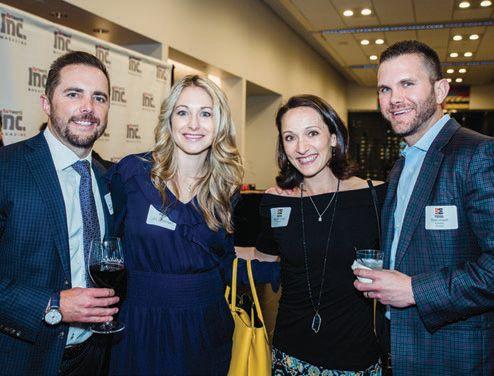
Fort Worth Inc. EOE Cocktail Party
Before the big gala on May 9, Entrepreneur of Excellence finalists enjoyed a little pregame at the EOE Cocktail Party on April 3 at Frank Kent Cadillac.
1. Robert Whittaker, Vanessa Hernandez
2. Justin & Evin Sisemore, Michelle & Ryan
Vinson
3. Cari & Mike Freeman
4. Griffith Babb, Jeff Jones, Jyothi & Winchel Jeffers, Prasad Reddy, John Vallance
5. Darlene Boudreaux, Hal Brown
6. Kayla Vestal, Saam Zarrabi, Raffy
Kouyoumdjian
7. Samantha Karcher, Leslie Bannister, Caroline Daniel 1 3 4 2 5 6 7









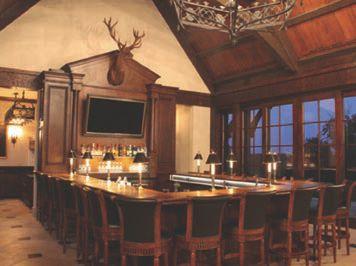




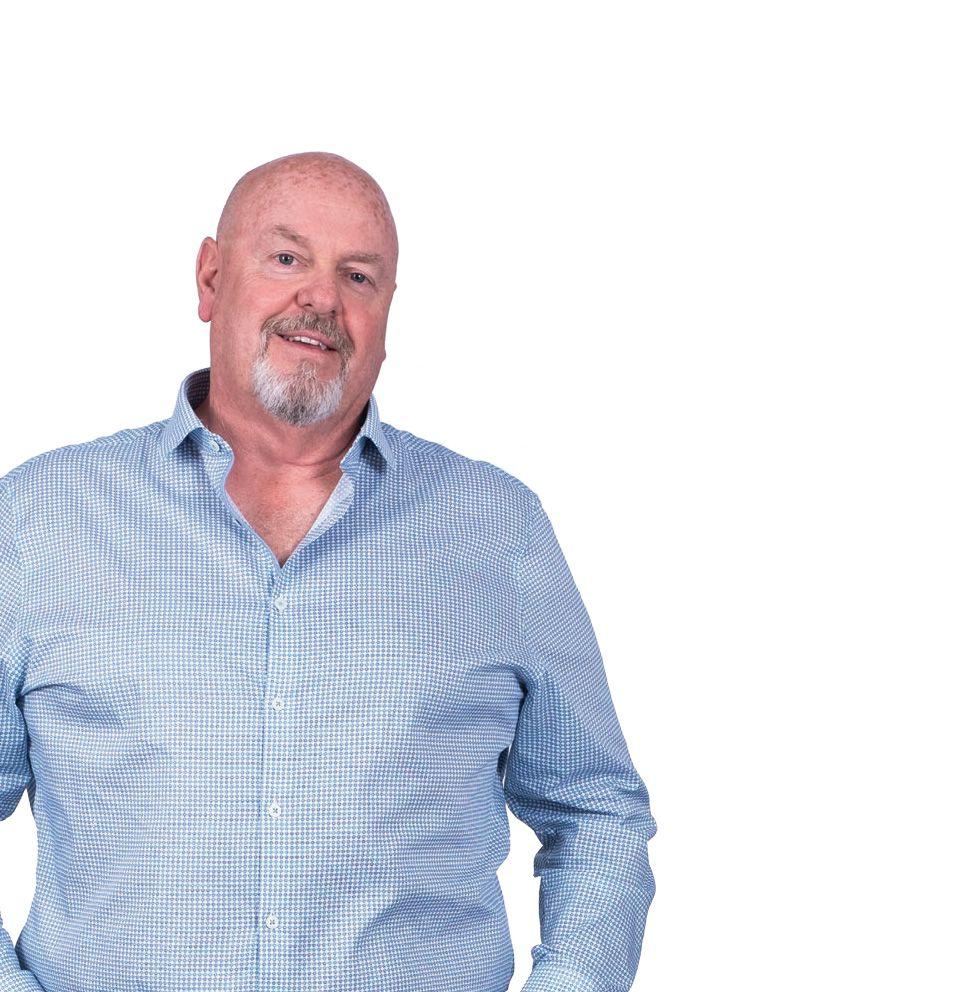
Fort Worth’s RIDE TV, a 24-hour horse sports and lifestyle channel now in its fifth year, today reaches 110 million households and is expanding aggressively this year.
RIDE TV is on quite a corporate trek. Launched in 2014, the Fort Worth-based, 24-hour horse sports and lifestyle channel now reaches 110 million households through its cable, satellite and online subscription. In March, it reached the coveted 1 million viewers mark one night for its hit show, “PBR Ride to Glory,” made in collaboration with Professional Bull Riders.

The company, located in Fort Worth’s Near Southside, now produces 27 different shows, mostly in Texas, from “Cowgirls” to “Ridiculous Ranches” (think “Lifestyles of the Rich and Famous”). And it counts Walmart heiress Alice Walton, likely the richest horsewoman in the world, among its investors.
This year, RIDE TV will grow rapidly, opening offices in New York, Los Angeles, London, Chicago and Detroit and will add almost 75 employees, “We are on a big expansion track right now and will be announcing big events in the near future,” said CEO Michael Fletcher.
The company focuses on two kinds of distribution: Over the Top or OTT — geek speak for accessing a streaming channel through a $7.99 monthly subscription to everything from your smartphone to your smart TV — and linear, or traditional cable and satellite platforms. “We took the strategy to play on both sides of the arena because future growth is on the OTT side, but the marketplace today is still with cable and satellite,” Fletcher, one of Fort Worth Inc.’s Entrepreneur of Excellence alumni, said.

RIDE TV GO, the OTT product, is avail-

BY TERESA MCUSIC
able on all typical player devices, iTunes and Android stores, Apple TV, Amazon Firestick, Google Play and Apple TV. If your smart TV has a browser, you can go to the website and watch there. “With RIDE TV GO, you can watch video on demand and livestream,” Fletcher said. “We also do special events that we also stream, like a barrel-racing event. It’s had a fantastic response. Since September, it’s grown about sixfold; subscribers are in the thousands. We hope soon to be in the tens of thousands.”
RIDE TV’s linear footprint today is mostly on DISH’s basic subscription service. “We didn’t start there; we started on the most expensive plan, but after a year, we proved ourselves to DISH. We had fan engagement; we had viewer engagement; people were actually switching from other operators to DISH to get it,” Fletcher said. RIDE TV is also on Comcast with Xfinity, Verizon FIOS, Google Fiber, Frontier and other small cable operators.
The company has big international plans. Currently in Canada and El Salvador, RIDE TV plans to expand into Europe, Asia, the Middle East and Latin America, Fletcher said. Its first rollout will likely be with Sky in the United Kingdom.
Advertisers are loving RIDE TV’s demographics, which skew upscale, 25- to 54-year-olds and female, Fletcher said. “The people who advertise on our channel are not all saddle-makers. Most are general market advertisers that understand the demographics,” he said.
As to the future, Fletcher is adamant the company will not be swept up into a media conglomerate. “We’re not selling, period,” he said.

The Economic Leadership Council is a select group of philanthropic women business leaders – a peer group of C-level executives – who are aligned with our goals to advance women’s economic security and women’s leadership. Members are advocates for economic equality and leadership opportunities for women, knowing that greater diversity of leadership drives better performance in literally every sector. Being architects of the new Women’s Leadership Institute, members are impacting the next level of women executives in their companies, industries and cross-sector.
Together, we aim to illuminate paths to leadership and strengthen the economic































Caren K. Lock
Chair
A. Shonn Brown
Chair-Elect
Roslyn Dawson
Thompson
President and CEO

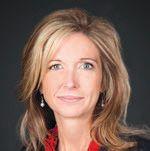






Bonner Allen
Cheryl D. Alston
Angeline (Angie)
L. Bain
Phyllis Fishman
Bernstein
Jennifer Biry
Lael Brodsky
Chrysta Castañeda
Bonnie Clinton
Jennifer M. Collins
Effie Dennison
Stacey Doré
Sara Garcia Duran
Samantha Dwinell
Patsy Fagadau
Theresa Flores
Hilda C. Galvan
Beverly Goulet
Janice Harissis
Mary Hatcher
Betsy Healy
Michelle Hudson
Jane Rose Hurst
Wei Wei Jeang
Keri Kaiser
Margaret Keliher
Laura Maxwell
Tracy Merzi
Sara Madsen Miller
Lisa Montgomery
Toni Muñoz-Hunt
Laura Nieto

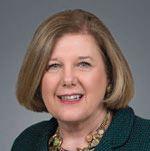

Carrie Freeman
Parsons
Elizabeth Carlock
Phillips
Priya Bhola Rathod
Diane Reeves
Virginia Rose-Harris
Dianne Capps
Saslaw
Janice V. Sharry
Judy S. Sherman



Craig Rogers President & CEO






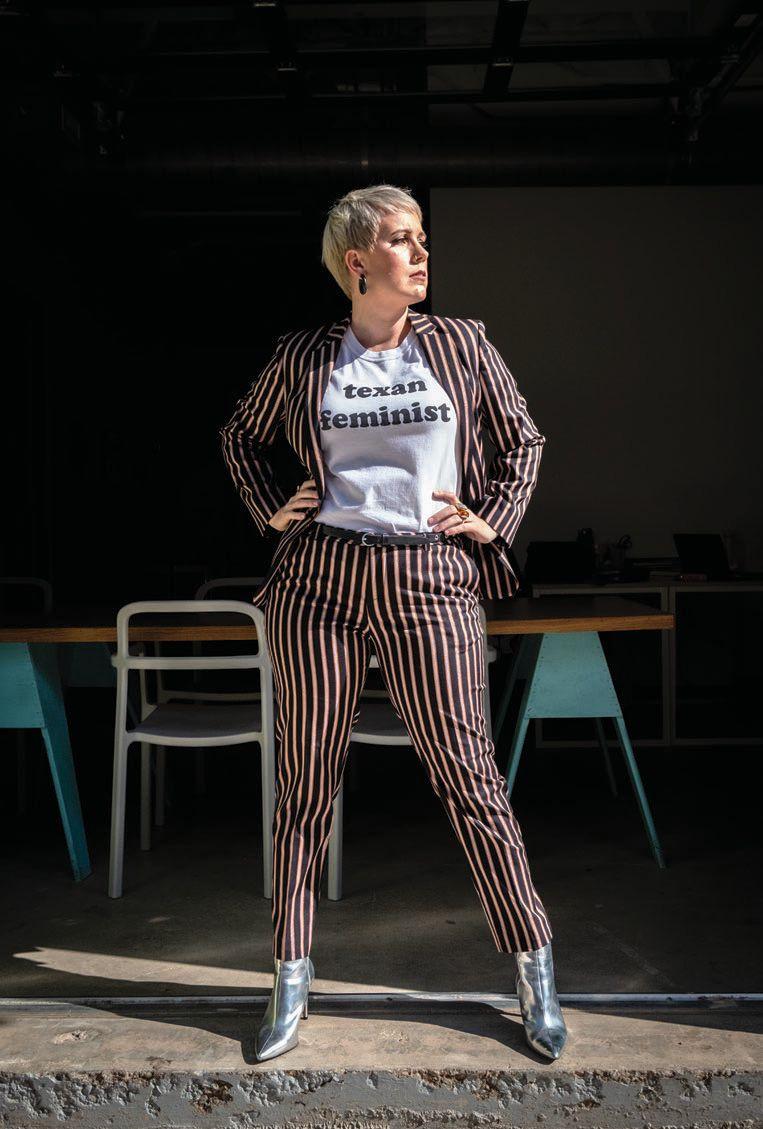
PR guru Holland Sanders isn’t afraid to go bold with her business. Or her style.
BY SAMANTHA CALIMBAHIN / PHOTOGRAPHY BY OLAF GROWALD
Business philosophy doesn’t always translate into fashion sense — but for Holland Sanders, CEO of public relations and marketing agency HOLLAND collective, it does.
That’s why you’ll see her or any member of her all-female team sporting anything from fashion-forward get-ups to shorts and T-shirts at work. Sanders hopes her office can be, as she likes to say, “a space for women to be their whole self.”
“When you have a space where women are allowed to not just be
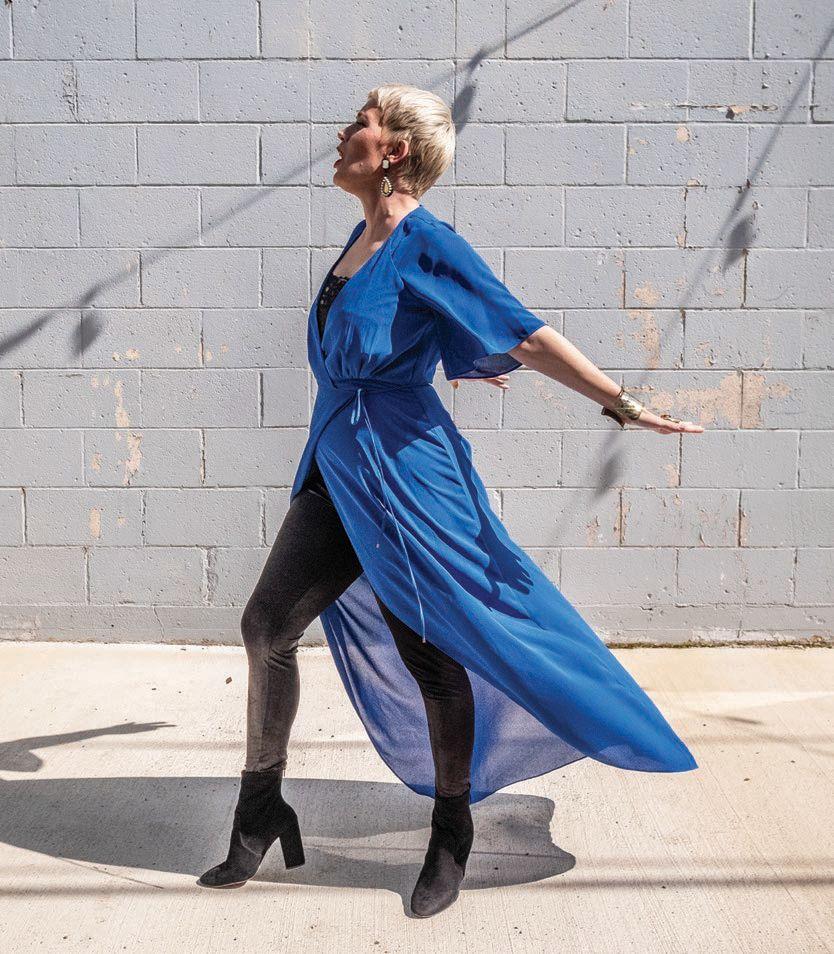
LEFT: Suit, Scotch & Soda, scotch-soda.com, $198 (blazer), $135 (pants) “Texan Feminist” T-shirt, Boss Babes ATX, bossbabes.org, $24 Silver boots, Gianni Bini, Dillard’s Clearance Center at Ridgmar Mall, $42 Thick black ceramic hoop earrings, Gifted (product no longer available, but similar styles on giftedftw.com)
ABOVE: Halston blue sheer dress, Dillards Clearance Center at Ridgmar Mall (similar styles available at dillards.com), $65 Lace vintage bodysuit, thrift find, $7 Faux leather leggings, H&M, hm.com, $18 Aldo black suede booties, DSW, dsw.com, $69.99 Earrings in Finn Design from Buenos Aires, byrd + bleecker Fort Worth, byrdandbleecker.com, $65
themselves but every ounce of who they are, they begin to unlock all of this potential,” Sanders says.
She takes that idea — being one’s “whole self” — into her work as well, building her company on the concept of creating narratives around brands and telling clients’ stories as a way to connect them with the community. HOLLAND collective is drawn to the entrepreneurial spirit, which is why many of its clientele are local names like Salsa Limón and Novak Hair Studios.
“If you think about the essence of our business, it’s about deducing someone’s brand into something that connects on a personal, authentic and real level,” she says. “When we create spaces where people are allowed to be personal and authentic, then it’s a lot easier to understand that marriage between client and brand and world.”
So, what defines Sanders’ personal style? Vintage pieces. Bold patterns and shapes. Complexity.
“I am a complex woman, and I have a lot of different interests,” she says. “When I think about style, it is the kind of thing I want to represent in the sense that I am not doing this life like anybody else.”


The family at RJ Williams & Company would like to personally thank Trinity Habitat for Humanity for giving our community in Fort Worth a hand up, not just a handout.
Your hard work truly shows in our community. From providing affordable housing options to giving families a fresh start and a chance to live the American dream of homeownership!
We are so appreciative to be a part of the journey building stronger communities and improving peoples lives.
The personal impact that habitat has had on my family and my wife’s family is more than just life-changing; it has been a conduit for success that has altered the course of our history.
Together we are stronger...
Thankyouforallthatyoudo!

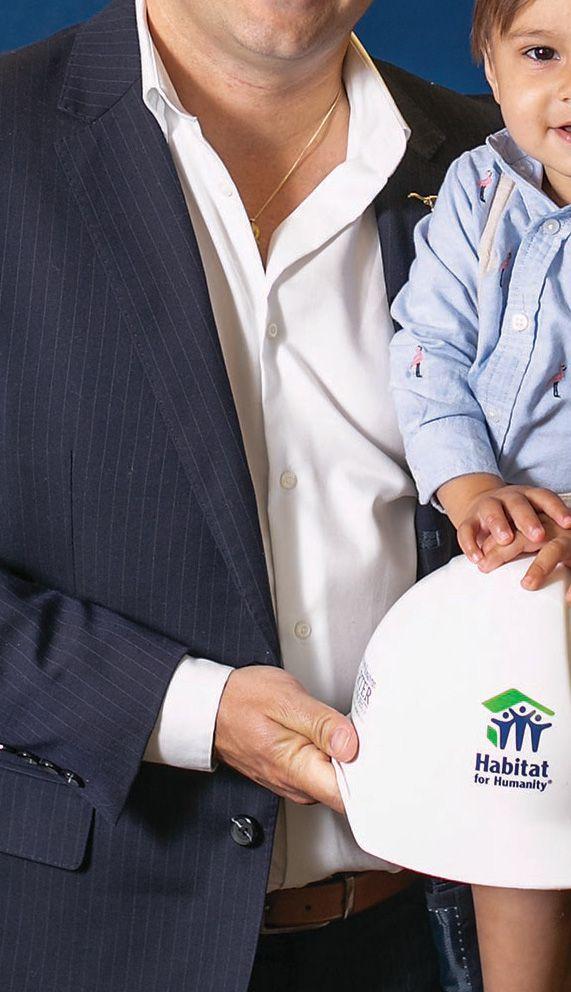


RJ Williams & Company is proud to be one of Fort Worth’s largest locally owned real estate brokerages. We believe that family is most important. Let our family take care of yours for all of your future real estate needs. Our mantra is “Take care of people and people will take care of you.”




They've got business savvy, but these Entrepreneurs of Excellence have skills in the kitchen too.
BY MARIANA RIVAS
Sure, real estate, background screenings and event planning are their day jobs, but these Entrepreneurs of Excellence also know how to bring creativity to the kitchen. Here, they talk about what fuels their culinary passions — and share their favorite recipes.
The Keto Cook:
Mike Coffey, Imperative Information Group
Mike Coffey’s recent ventures with the keto diet inspired a better cooking regime. Finding alternatives to carb and sugar favorites has been key for his new lifestyle.
“My wife and kids were not interested in a low-carb diet that means dropping wheat, rice and, most importantly, sugar … so, I had to start cooking for myself,” Coffey says. Here, he shares a cookie recipe to help kick those sugar cravings.
Keto-Friendly Cookies
Ingredients:
1 1/2 cups almond meal
1/2 cup salted butter
3/4 cup Lakanto granulated monkfruit sweetener
1 teaspoon vanilla extract
1 large egg (50 grams / 1.7 ounces)
1/2 teaspoon baking powder
1/4 teaspoon salt
1/2 teaspoon xanthan gum
3/4 cup Lily’s dark chocolate premium
baking chips (sugar-free)
Preheat oven to 350 F (Coffey says using the convection oven setting works best). Microwave the butter for 30 seconds to melt, but it shouldn’t be hot. Beat the butter with the monkfruit until well blended. Mix in the vanilla and egg on low for 15 to 20 seconds. Mix in the almond flour, xanthan gum, baking powder and salt. The batter will be pretty thick. Add the chocolate chips and knead them into the batter by hand. Roll the dough into 12 balls and place on cookie sheet lined with parchment paper. Bake for 10 minutes (Coffey says he usually adds a couple extra minutes to get the desired browning). When still warm, the cookies crumble easily, but once they’ve cooled, they keep their shape well.
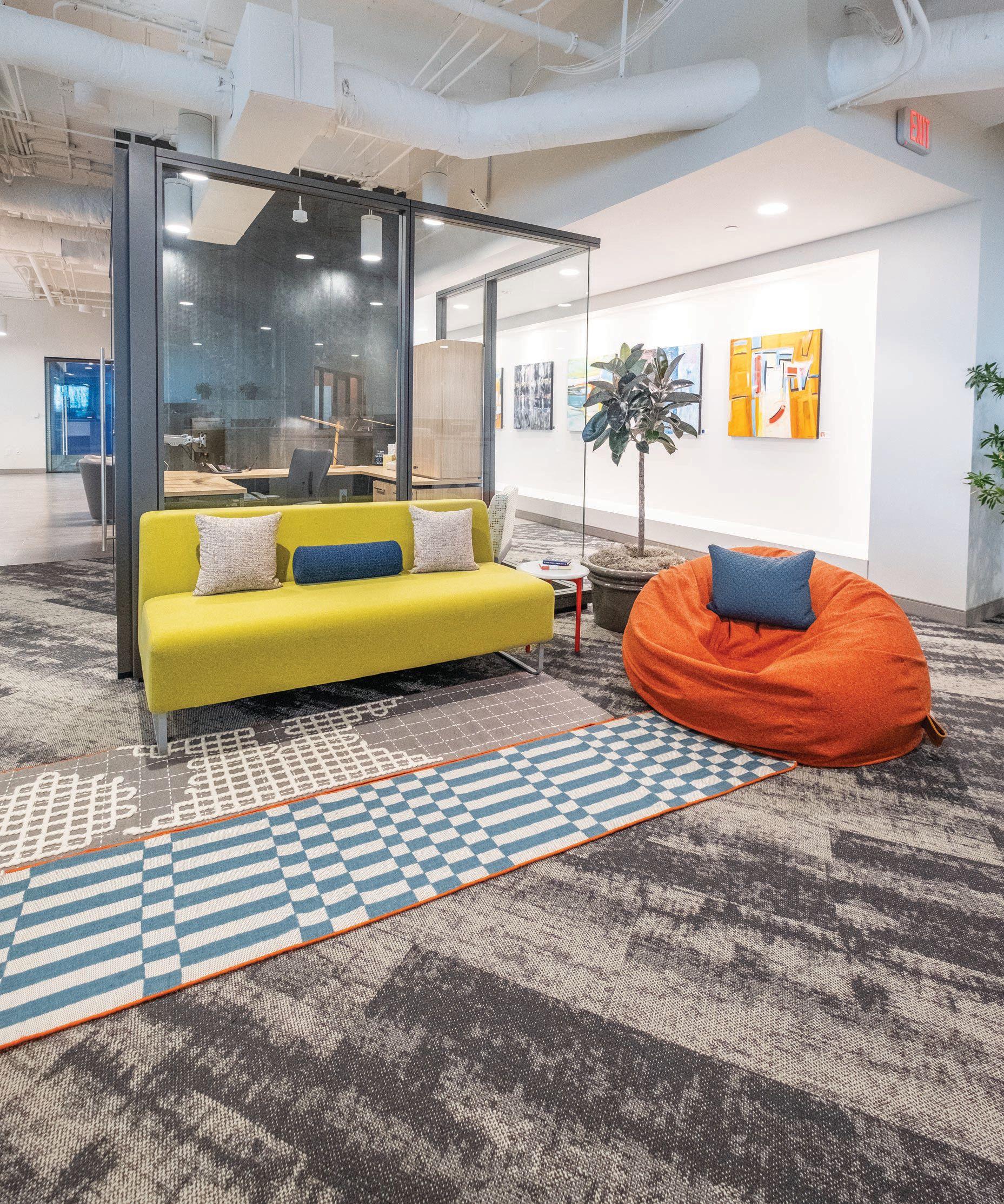

John Staab, Motive Real Estate Group
John Staab grew up helping his mom around the kitchen, “primarily washing dishes, chopping things, stirring and making big messes,” he says. But he “started cooking for real” about 20 years ago. His specialty — grilling.
“We recently grilled a whole octopus, which wasn’t the most appetizing thing to prepare and turned into a really involved process,” Staab says. “It turned out amazingly well.”
But, he spares us from the exotic as he shares his go-to recipe.
Grilled Lemon Butter and Garlic Salmon
Ingredients:
One whole wild salmon fillet with the skin on (about 2 pounds)
5 cloves of garlic
4 tablespoons butter
1 lemon
Fresh parsley
Salt and pepper
In a small bowl, melt butter and add the zest and juice of an entire lemon, along with finely
small whisk. Cut the salmon fillet in half, score it with a sharp knife in a diamond pattern and place it on a baking sheet. Be careful not to cut the fillet all the way through the skin. Slowly pour the lemon and butter mixture into the grooves you cut and use your fingers to massage the mixture into the fish. Sprinkle with salt and pepper and finely chopped parsley. Let sit for 20 minutes.
Fire up the grill and bring it to a fairly high heat, around 500 F. Place the salmon fillets on the grill with the skin side down. Cook for 4 1/2 minutes, then gently turn the fillet over using a large spatula. Cook another 3 1/2 to 4 1/2 minutes, depending on how well done you like your salmon. Remove from grill and let it rest on a plate for a couple minutes before serving.
Garnish with fresh lemon wedges and serve with grilled vegetables like asparagus, summer squash, Brussels sprouts and broccoli.
The Crowd Pleaser:
Walter Kinzie, Encore Live
For Walter Kinzie, cooking is all about people, often making food for coworkers, family and friends.
“It is a way for me to contribute at home
and show my family how much I love and appreciate them,” he says. On Sundays, his 4-year-old daughter, Piper, helps out.
But Kinzie can also feed a crowd of more than a thousand. “I have fed our customers at a number of events that range in size from a few dozen to over 1,600 people. We are not a catering company, but I love cooking for people — so it’s worth it to seize the opportunity.”
Walt’s World-Famous Homemade Grilled Apple Pie on the Grill
All pies are an individual serving. Repeat steps 2–14 for each person in your dinner party.
Ingredients: Butter
Pillsbury pie dough (unbaked and commonly packaged with two rolled-up crusts)
Sliced apples (Jazz apples are Kinzie’s favorite)
Sugar
Cinnamon
Blue Bell Homemade Vanilla Ice Cream
Heat the grill to 400 F. Lay out a piece of aluminum foil (approximately 12 inches by 12 inches square). Coat the face-up portion of the foil with butter. Cut one-third of one of the pie crusts off and lay it on the butter on the foil.
Put sliced apples in the center (about one-third of a large apple). Put a spoonful of sugar on the apples. Sprinkle a teaspoon of cinnamon on the apples. Put a spoonful of butter on the apples. Grab each corner of the aluminum foil and bring them together in the center, making a loosely packed ball out of the aluminum foil and leaving a very small opening at the top for heat to exit the foil.
Place on the grill (not directly over the fire) and leave for approximately 18 to 20 minutes or until the outer edges of the pie crust have hardened and are golden brown. Remove from the grill and allow a few minutes for the foil to cool off. Open the foil from the center, revealing the baked pie in the middle.
Add a scoop of ice cream over the pie and serve the pie while still inside the foil.







CEO on KERA invites you to the table as renowned journalist Lee Cullum interviews prominent chief executives from North Texas and beyond. Go to explore leadership styles and ethics. Go for insight into what makes companies successful. Go for the engaging conversation. Go Public.
HOSTED BY LEE
CULLUM
FULL SCHEDULE AT KERA.ORG/CEO



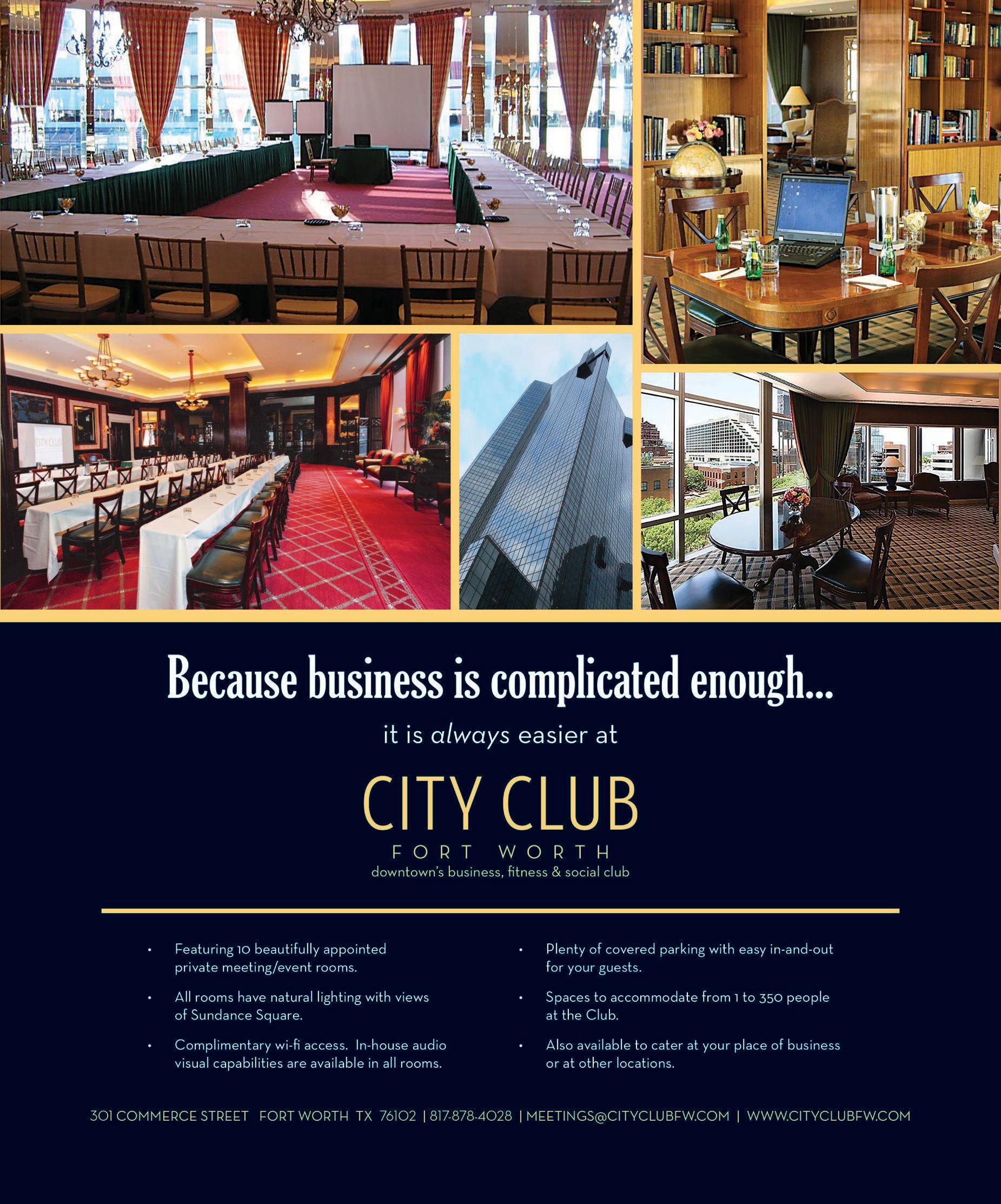

So, you want to show someone how to do something on the computer — remotely but also face-to-face. Screencast-O-Matic, a video recording and editing tool, can record what’s happening on both the computer screen and the webcam, simultaneously and separately. Users select the portion of the screen to record, and after recording, they can alter the size and location of the webcam screen on the video. Users can then share the videos on a variety of platforms. One local company that utilizes Screencast-O-Matic is Patterson Law Group, which uses the program to create presentations and share information with clients and coworkers.
Cost: There is a free version. Paid plans with more features start at $1.50 per month for a solo plan and $9.50 per month for a team plan.
Where to Find: screencast-o-matic.com
Local businesses can vouch for these digital programs that bring innovation and improved efficiency to the office.
There’s an app for just about anything, but some apps just get how business works — and the day-to-day operations that can make or break a productive workday. Here, these Fort Worth businesses share the nifty office tech they utilize to make those daily tasks just a little bit easier — and maybe a little more fun.
Between phone tag and back-and-forth emails, setting up meetings can be the worst. But Schedule Once helps, according to Entrepreneur of Excellence finalist and
BY REBECCA WILLIAMS
president of Imperative Information Group, Mike Coffey. He uses the program to set up meetings of various types, from sales consultations to phone conversations. Clients can select from a list of potential time slots and meeting places. If clients provide their phone number, the system can also send a reminder text in advance of the meeting.
Cost: Plans start at $7.50 per month.
Where to Find: oncehub.com/scheduleonce
The Receptionist, utilized by real estate firm Fort Capital, is a digital check-in system for guests, used in lieu of employing a human receptionist. The program functions through an iPad, allowing guests to enter their personal information, take a photo of themselves and select the employee with whom they are meeting. The employee is then alerted of their guest’s arrival by text and email and can respond with a quick welcome message.
Cost: Plans start at $49 per month. Where to Find: thereceptionist.com



In an old, abandoned fire station once overlooked by passersby, Urbanology Designs builds an office space defined by clean lines and organic elements.
BY SAMANTHA CALIMBAHIN / PHOTOGRAPHY BY OLAF GROWALD







A BIG TEXAS THANK YOU to our amazing Roadies Team Members, Doctors and ALL the incredible patients we serve in our communities. We appreciate the opportunity in ‘Bringing It’ every day these past 10 years to see you smile. On behalf of all of us at Rodeo in our 10th year, THANK YOU!
ear, THANK YOU!


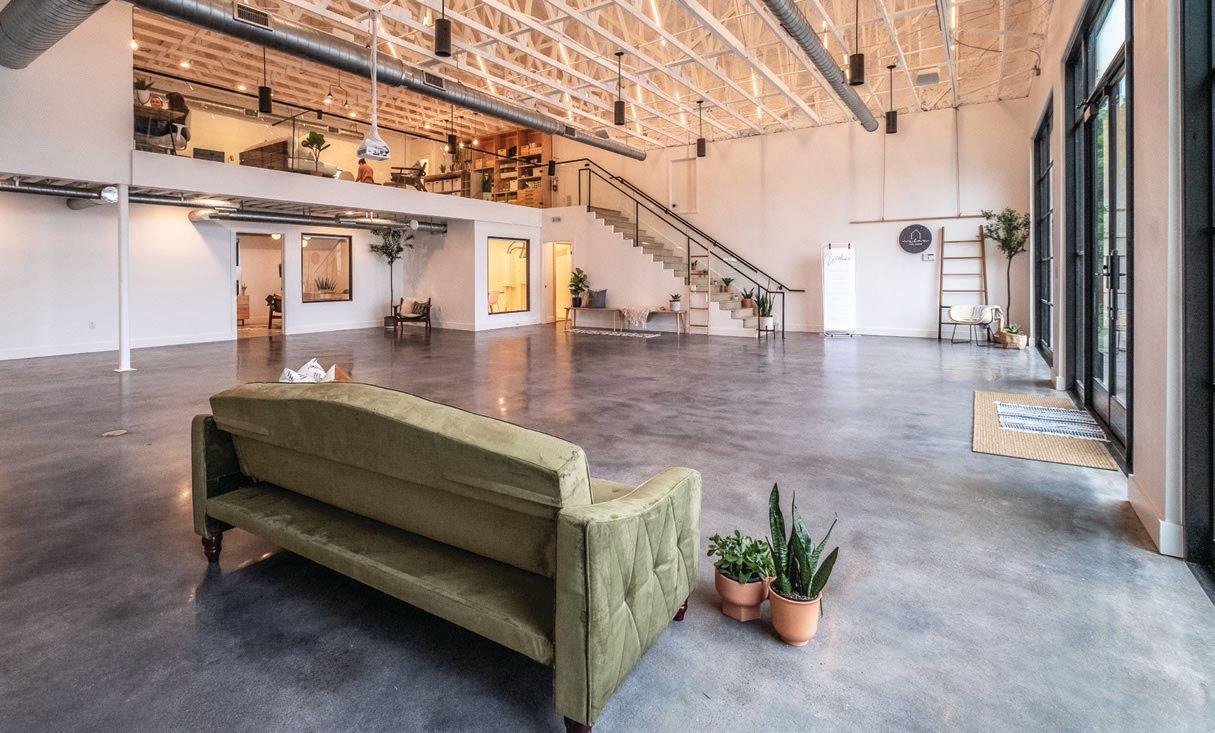
Ginger Curtis used to ride her bike past the firehouse at Starnes Road as a little girl growing up in North Richland Hills — not realizing how much the building would mean to her as an adult.
Curtis, owner and founder of interior design firm Urbanology Designs, was looking for a permanent office for her company when she found herself driving past that empty firehouse once again. Then, she got an idea.
“I thought, you know, that old, dilapidated building has just been sitting there rotting, but it’s got the coolest architectural lines; it’s got these great details,” she says. “Nobody could see the potential in it. It just sat there.”
So, before she reached the red light, she says, she called the economic developer of North Richland Hills and asked if the city would sell the old fire station to her. Not long after, the two parties met, and it was a done deal.
After a series of hiccups, rezoning and “tears,” Curtis says, Urbanology Designs was able to begin the renovation — keeping the building’s original architectural lines but redesigning almost everything else, adding larger windows and wider


columns to the exterior while building out an office space inside. Working with contractor and project manager Mission Street Design Build, Urbanology transformed the approximately 4,000-square-foot space into an urbanmodern interior design office, complete with an upstairs loft, event space and coworking space for other entrepreneurs. The company moved in, in February.
Curtis describes the office’s aesthetic as similar to her company’s brand — “very bespoke, artisan, handcrafted.” Neutrals dominate the color palette — bright white walls are accented with touches of black, gray and gold, with pops of color coming from bright green succulents and other plants throughout the space. More color comes by way of commissioned paintings by Louisiana artist Claire Gowdy.
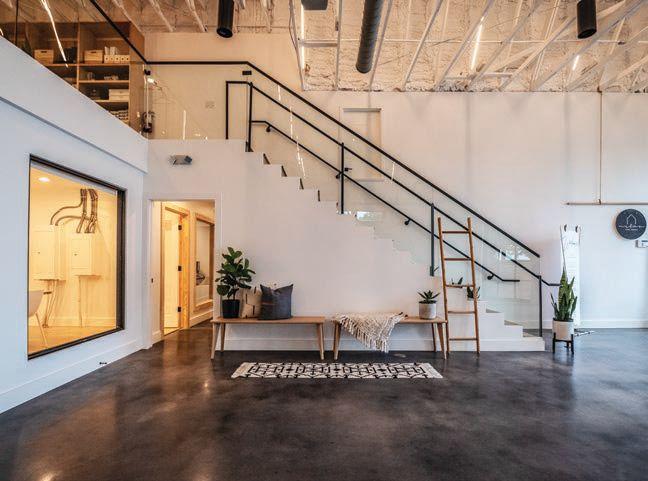





















“The pop and contrast of that green looks so stunning with these very natural elements,” Curtis says. “I do love monochromatic, but I also love bold contrast. We can get both in the space.”
Curtis says the space hasn’t just given her company a more aesthetically pleasing place to work — it’s allowed the business to expand its offerings through event styling (a service known as Urban Fire House), coworking (Urban Design Works) and offering the space as an event venue for weddings and parties.
Not to mention it’s also just a mile away from Curtis’ home and half a mile from her children’s school — in the city where she grew up.
“This building feels like my home,” Curtis says. “It doesn’t feel like an office to me.”








This year’s Fort Worth Inc. EOE competition features
everything from a guy who’s making a ton of money of frac sand to another one who accidentally joked his way into an international fulfillment business.
BY SCOTT NISHIMURA / PHOTOGRAPHY BY OLAF GROWALD
Welcome to Fort Worth Inc.’s 2019 Entrepreneur of Excellence Awards, our independently judged annual competition that sets out to turn up as many of the region’s most compelling entrepreneurial stories as we could find.
The 2019 EOEs highlight 32 finalists from 11 categories, ranging from commercial and residential construction to consumer goods, energy, health care and life sciences, hospitality, media, professional services, real estate, tech and ecommerce and transportation, logistics and distribution. We’re also honoring the former Tech FW executive director Darlene Boudreaux with a special Supporter of Entrepreneurship Award for her contributions to Fort Worth’s entrepreneurship ecosystem, including nurturing numerous life sciences startups through the Tech FW incubator and founding the Cowtown Angels investing group.
First Preston HT ran the contest for the magazine. Independent judges reviewed the applications of entrepreneurs who applied for consideration in the contest. Judges picked a winner in each category, and those were revealed May 9 at a dinner at Cendera Center, on our website, fwtx.com, and here in Fort Worth Inc. Critically, First Preston HT, the judges and judging were free of influence from the ownership and staff of the magazine.
Sponsors of this year’s EOE event were Whitley Penn, presenting sponsor Origin Bank, platinum sponsor Kelly Hart, gold sponsor and Frank Kent Cadillac, automotive sponsor
Judges evaluated the applicants in financial performance, vision, best practices, relationship building and community involvement, with equal weights. At least $2 million in annual sales was required for eligibility. The applicants’ financial data was available to the judges but not for this story. In interviews with the magazine for these stories, some of the applicants disclosed data on financial performance. This report also uses data from other publicly available sources. Two applicants were allowed to submit a single entry if they each have 50 percent ownership in their enterprise.
Frank Dale CEO, Frank Dale Construction, Southlake Business: Construction

Frank Dale has spent the last few years setting up his Southlake construction company, founded in 1997, for the future. He’s added two vice presidents, over operations and new business, and is broadening the firm’s portfolio of commercial, industrial and religious work.
“We’re really trying to develop the commercial side,” Dale says. The company also has expanded into senior living projects. Dale thinks annual revenue of $100 million to $125 million is possible.
At the same time, Dale and his longtime business partner, Bob Armstrong, have steadfastly maintained the firm’s values of

high ethics and family culture, not taking projects too far from the home base and insisting employees take time out to attend their children’s soccer games. “I will send you home every night,” says Dale, whose modest Southlake office is filled with photos and other mementos of raising his own children. Dale and Armstrong promote an upside-down flowchart for the 30-employee firm, with project superintendents at the top and the owners on the bottom. That way, the company promotes maximum internal response to the needs of its supers, Dale says. Why? “If he doesn’t perform, the ship sinks.”
Early in his career, Dale worked 17 years for an international general contractor and found he didn’t like it. “Three or four days a week, I’m on the road, going from job to job,” he says. “I did not see my kids.”
Dale founded his company, joined quickly by Armstrong. The firm has focused on private business and doesn’t pursue adversarial government contracts. “Private is very customer-oriented,” he says. “We don’t do the adversarial work. It takes a rare individual that can build them both.” A high number of its clients are repeat. “Nothing speaks better for a company than having 70 percent repeat clients.”
Michael Freeman President, Steele & Freeman, Fort Worth Business: Construction

Downtown Roanoke stands as a portfolio for Steele & Freeman, a secondgeneration Fort Worth construction firm founded by David Freeman in 1979 and headed today by his son, Michael. The gleaming new City Hall, opened earlier this year, is the latest project, following a fire station, recreation center and library.
This is the way Steele & Freeman likes doing business: levering longtime relationships to keep generating new business. It’s even transferred its Roanoke model to Flower Mound with the move of a town executive from one city to the

other. Steele & Freeman is now on its third project for Flower Mound.
“We do most of our business on referrals,” Freeman says. “The thing that separates us is the relationships. We create the perpetual client.” Steele & Freeman surpassed $100 million in annual revenue in 2016 and today has a $260 million backlog, Freeman says. The company, which has 64 employees, is building a new juvenile detention center for Tarrant County and has new contracts in The Colony, Ennis and Midlothian.
Steele & Freeman also nurtures relationships with its subcontractors, paying, for example, on time and sometimes early.
“Subs may have to bid 10 jobs that day,” Freeman says. “We want them to bid our clients. We’ve always focused on being the contractor of choice for our clients. The last five years, we’ve focused on being the contractor of choice for our subs as well.”
The company also has invested in employee loyalty. Freeman, who bought out his father in 2005, has sold stakes to five other key employees. Freeman hands out $100 gift cards to employees who receive praise from clients, and he gives holiday bonuses to employees’ spouses and significant others. “We don’t have turnover,” Freeman says. “We really don’t have people leave.”

Larry Kemp
CEO, Kemp & Sons General Services, Fort Worth Business: Custodial services

Last year could have been one to forget for Kemp & Sons when it lost a major Veterans Administration custodial services contract in October after 11 years. Instead, Larry Kemp, co-CEO of the family-owned Fort Worth firm, says he’s determined to make the company stronger from the experience. “It turned out to be the best thing that could have happened to us,” he says.
The VA contract, the company’s largest, was worth about $1.5 million a year in sales, or a total $5.1 million of the company’s base at that point of $22 million in contracts, Kemp says. The company moved quickly to replace the lost revenue, entering, for one, a new business in March when it took on a federal contract to handle laundry for soldiers and employees at Fort Hood in Texas. That contract is worth $2 million, Kemp said. Kemp & Sons leased a laundry facility in the Fort Hood area with rights to use it in the off-hours and has about 10 employees serving the contract. Kemp is moving to seek other new contracts; it’s agreed in principle to provide laundry services at another U.S. Army base, adding $8 million in contract total. “To grow like what we want to, you just have to be nimble,” Kemp says.
Kemp started his career at IBM and became part of the financial management team. In 1998, he took over the helm of the cleaning business, which his father founded in 1972. His wife, Reggi Sturns-Kemp, is CEO and president. Her sister, Debera Sturns-Miller, came aboard several years ago as quality assurance manager and runs training for employees.
In 2018, the company did about $5 million in sales, Kemp says. He believes it can do $7 million to $8 million in 2019. Today, it has about 160 employees. Today, Tarrant County College and Dallas-Fort Worth Airport are the company’s largest customers.
Kevin Lackey
CEO, Freedom Powersports, Fort Worth Business: Powersports retailer, 14 locations, Texas, Alabama and Georgia

Kevin Lackey has spent the last few years as CEO of his Freedom Powersports “focusing on what we have,” rather than aggressively adding stores and pursuing growth, the company’s story after Lackey founded it in 2012 with the purchases of stores in Weatherford and Hurst, and it grew quickly to 14 stores in three states and today’s $150 million in annual sales and 350 employees.
The last few years have “been less about growth and more about people, technology, processes, and really trying to get the business into a healthier position, better cash flow, less leverage, less turnover,” Lackey says. “We feel really good about saying we would like to go into acquisition mode but slower” than previously.

Lackey invested in the Entrepreneurial Operating System, a system with strategies and tools designed to get everyone in the organization on the same page with the owner’s vision; instill focus, discipline and accountability; and promote a healthier, more cohesive leadership team. Freedom is working on refilling its pipeline with potential managers, and it installed better accounting systems to support a multistore company. Lackey implemented a sales platform and ongoing employee training on everything from sales to customer service and operations.
“We had nothing,” he says. “We were flying blind.” The sales training, in particular, focuses on overcoming customers’ objections. “We didn’t have sales
professionals who were trained to meet different objections.” Lackey considered selling some out-of-state stores to tighten Freedom’s focus but decided that would be inconsistent with the company’s growth posture.
Freedom still gets offered prospective acquisitions, but Lackey says the company will be a lot more selective as it moves forward with growing again. The company has determined the model for what “the right size” looks like in a dealership and is a lot more sophisticated at spotting potential problem spots in an existing business. And to make an acquisition, “I would have to find really good seller flexibility” — a seller willing to finance. “We took on a lot of debt to make these earlier acquisitions.”

Prasad Reddy CEO, Twisted X, Decatur Business: Footwear maker

Twisted X, a Decatur-based maker of footwear, continues to add to its growth story. The company finished 2018 at $72 million in sales, up from $61.6 million the previous year, CEO Prasad Reddy, an industry turnaround executive who led a group that bought the company out of bankruptcy after its filing in 2008, says. The company was recording $8 million in sales when Reddy came aboard.
The latest growth vehicle: newly launched Comfort Technology it initially started in its women’s casual shoes. Demand took off, so Twisted X is incorporating the technology in its other shoes and boots, Reddy says. “The reception has been phenomenal, trying to catch up to the demand. We worked on it for two years. At the end of the day, product talks.”
Twisted X, a brand inspired by the shape of barbed wire, has more than 80 employees and 30 independent sales reps. It’s doubled in size every three years over the nine that Reddy’s group has owned it, he says. “We’re hoping this will help us for the next three years to double the company.”
The company, which sells through 3,000 retailers nationally and has avoided competing online with its retailers, also purchased the Black Star Boot Co. of Fort Worth — high-fashion women’s products — in January and is putting its comfort system in those products. Twisted X promotes a clean environment through the manufacture of its ecoTWX line, made of recycled plastic water bottles. It takes 13 bottles to make one pair of shoes; the company’s goal is to clean up 13 million bottles by 2020. “We’re up to 2 million now.” Twisted X also plants a tree for every pair of the shoes it sells. In June, Twisted X plans to launch a line of ecoTWX T-shirts, each made of six plastic bottles and bearing slogans such as “I am saving the planet. What are you doing?”

Principal, Yard Art Patio & Fireplace, Colleyville Business: Operator of six outdoor retail furniture stores

Garrett Wallace was a kid when his dad, who started selling outdoor furniture with one Yard Art store in Colleyville, started taking him along on deliveries. “He’d sell during the day, deliver at night,” Wallace says. “Me being 12, he would drag me to deliveries.”
Wallace’s dad, Butch, opened that store in 1994. Four years later, he opened a second store in Plano. “He was worried about having all his eggs in one basket,” the son, Garrett, says. Today, the company has six stores around the DFW area. Wallace worked in the stores through college, became merchandise manager, and today runs all of the stores. He’s interested in opening more stores in the region. “The big thing that drives [growth] is having the right people,” he says.
Butch Wallace, who was in men’s retail clothing, opened the first outdoor store when it occurred to him he could do a better job than the one store he knew nearby. The company has 38 employees today and nears 50 in-season. Yard Art offers a straightforward value proposition: 90 percent of what you see on the store floor can be purchased as is or ordered customized in six to eight weeks’ time. “We can order hundreds of styles custom,” Wallace says.
The merchandise mix is largely high-end, with some middle- and lower-end items. “There’s a balance there. We’re not here to gouge. We’re here to making a living and be a part of the community.” Wallace has a simple durability test for the merchandise he buys. “If I can’t honestly tell you it’ll last five years in the parking lot, we don’t buy it.”
Rhett
Bennett CEO, Black Mountain, Fort Worth Business: Frac sand provider to oil and gas companies; acquisition of mineral interests; upstream oil and gas

Rhett Bennett’s had quite the encore to his Black Mountain Oil and Gas I’s sale of upstream assets in New Mexico for $700 million in 2017. In the last 2 1/2 years, he estimates Black Mountain Sand, a company his firm founded with private equity partner NGP of Irving, has invested $800 million in finding, mining and transporting in-basin frac sand to drilling sites, where it’s used in the process of fracturing rock to release oil and gas. The partnership has three mines in West Texas, two in South Texas and another in Oklahoma. Having the mines and their plants close to oil and gas basins has stripped away the substantial cost of transporting frac sand from Wisconsin by rail, which, Bennett notes, isn’t long on cutting pricing discounts. Black Mountain can offer transportation of less than 100 miles, compared to 1,000 miles from the Upper Midwest, taking an average $500,000 cost of out of each well, Bennett says. “It’s been a game-changer.” Black Mountain Sand has grown to 300 employees today, including 50 at the downtown Fort Worth headquarters in Sundance Square. He estimates the sand company will do $250 million to $275 million in earnings before depreciation, interest, taxes, depreciation and amortization this year and is worth more than $1 billion if taken public.

The supply of the cheaper sand has pushed prices down, but that has mostly hurt the Midwestern mines. “It’s grown from nothing to wide-open in two years,” Bennett says.
Bennett, a Kentuckian, grew up in a multigenerational family still in the coal mining business. He left Kentucky for the University of Georgia. He could have joined the family business after graduation but moved instead to Dallas, where he slept on a friend’s couch until he found his first job with a geologist. That’s where Bennett learned all about subsurface and decided he wanted a career in oil and gas. “I just loved the business from Day One,” he says. He just didn’t like Dallas. “I loved Fort Worth.”
Bennett moved to Fort Worth and started Black Mountain in 2007 at age 26, using $100,000 from the sale of a home he owned in college and obtaining a line of credit to start his business, buying minerals. “You’re buying a lot of singles,” Bennett, now 37, says of the startup process. Cash flow kicked in, and “it’s kind of a snowball effect. It keeps getting bigger and bigger.”
This is where Bennett says he wanted to be. “I always had the risk appetite and never felt I wanted to be constrained by the corporate side.”

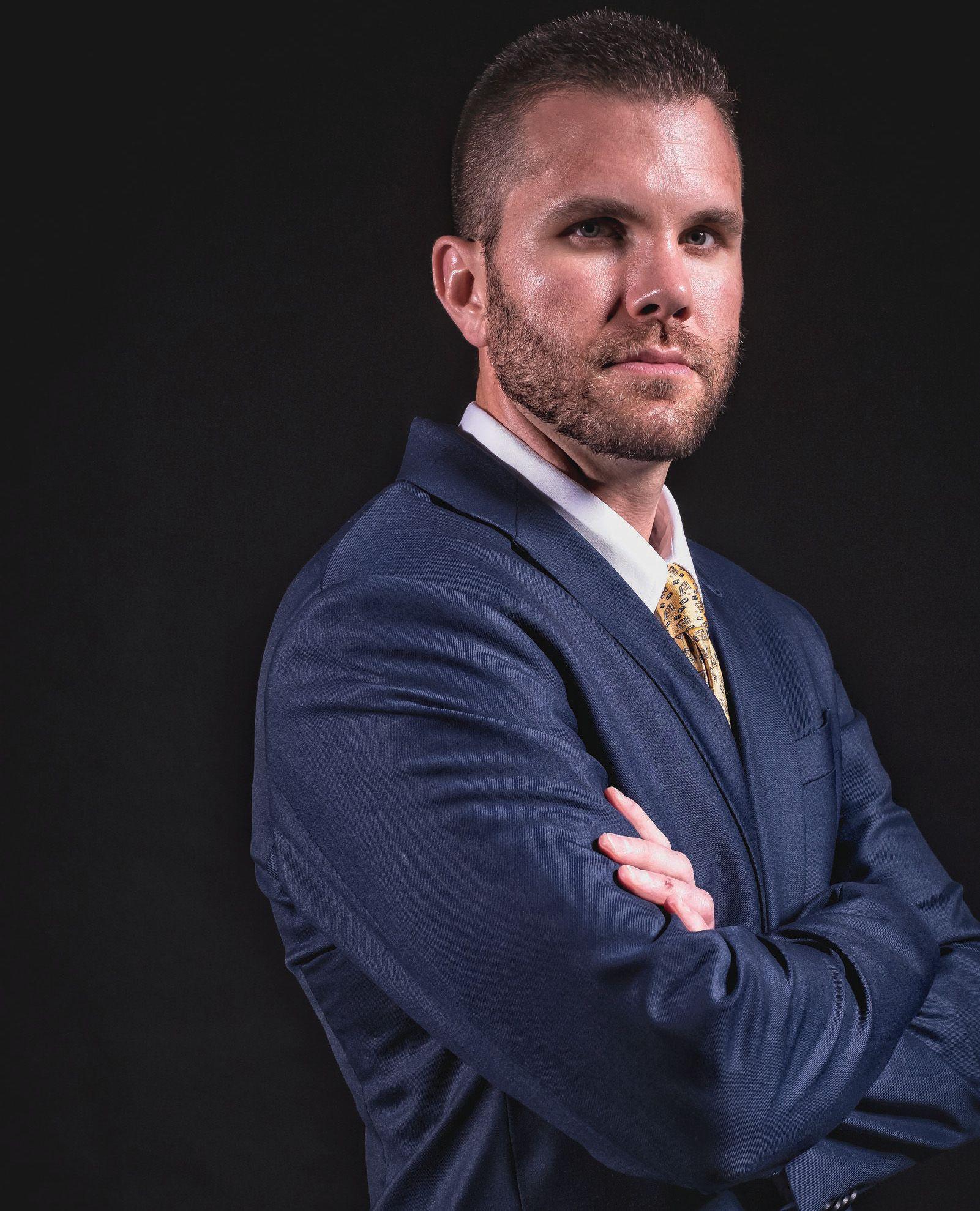
CEO, Mineral Ware, Fort Worth Business: Mineral management software for banks, institutions, investment funds, foundations, family offices and individuals

It’s been only five years since Ryan Vinson and partner John Baum started their small company out of Vinson’s garage, selling a software solution to a byzantine problem — allowing mineral rights owners to easily manage their holdings and make sense of the pile of numbers they were receiving in the mail. That’s if those owners were on top of their holdings enough to be receiving mailbox money.
The fast-growing company soon moved into small offices in downtown’s Oil & Gas Building, then into the Fort Worth Club Tower. Earlier this year, Mineral Ware moved again, this time within the tower into 10,000 square feet of modern office space, becoming the biggest tenant. Mineral Ware doesn’t disclose sales but says later this year, it expects to hit a target of $250,000 in recurring monthly revenue the company set in 2016. That would trigger a bonus to employees of up to 50 percent of salary, depending on time with the company. “We’re scheduled to hit it this fall,” Vinson says. “We’ll hit it early.”
The new digs give Mineral Ware, held today by Vinson, Baum and the well-connected Four Sevens Oil Co. partner Larry Brogdon, whom Vinson and Baum brought in as an investor and partner, room to grow, including a new software company Vinson has quietly launched but isn’t unveiling yet.
Mineral Ware has 200 clients today, including 40 in the pipeline, Vinson says. The client flow is such that when Mineral Ware, which has 25 employees, recently expanded its staff, it didn’t add salespeople. “Sales have not been a problem,” Vinson says. He expects the staff to grow to about 35 people by the summer.
Dr. Saam Zarrabi
Partner, Rodeo Dental and Orthodontics, Fort Worth Business: Operator of 20 dental clinics across Texas

When Dr. Saam Zarrabi and his two partners founded Rodeo Dental in 2008, they didn’t envision having multiple clinics statewide. Today, Rodeo Dental, whose offices are based in the Water Gardens Place in downtown Fort Worth, has 500-plus employees and 20 clinics across Texas, with plans to open as many as six more this year and another 10 to 12 next year. “When we started, we had the idea for just the one practice,” Zarrabi says. A funny thing happened. No, really. Rodeo’s clinics sport colorfully themed lobbies and production stages designed to put patients at ease and in the middle of a “pop celebration”; the stages are torn down monthly and rebuilt with new themes. Some patients — 70 percent are children — even arrive in costume. Rodeo centralizes functions at the headquarters offices, including appointment setting, insurance verification, accounting, marketing, human resources, patient loyalty, expansion services and purchasing. This leaves the clinic staff free to focus on customer experience, which includes everything from giving office tours to new patients to celebrating their birthdays and providing “Epic Sendoffs” at the end of each visit.

In 2016, the company invested deep in its IT with CEO Ben Rouse, an IT veteran who’s not a dentist. Clinic staff see a simple data dashboard each day that highlights number of appointments; those without insurance; specialty appointments; number of first-time visitors; orthodontic visits; appointments scheduled by “Winter Texans,” seniors spending the winter in the warmer South; “Gumdrops,” or patients in for their first orthodontic consultation; and birthdays. “If you don’t have a strong foundation in IT and software, you can’t scale,” Zarrabi says. “It was all manual within the practices.”
The company follows its customers after their visits, asking patients during their Epic Sendoffs if they’re willing to submit a review. “If they say yes, we will send you a text” with the link to the review form, Zarrabi says.
Rodeo has 92 providers, including 50 in the offices. The remainder are specialists who move among the offices. Rodeo has no revenue production goals. “Everything is based on experience and service,” Zarrabi says.
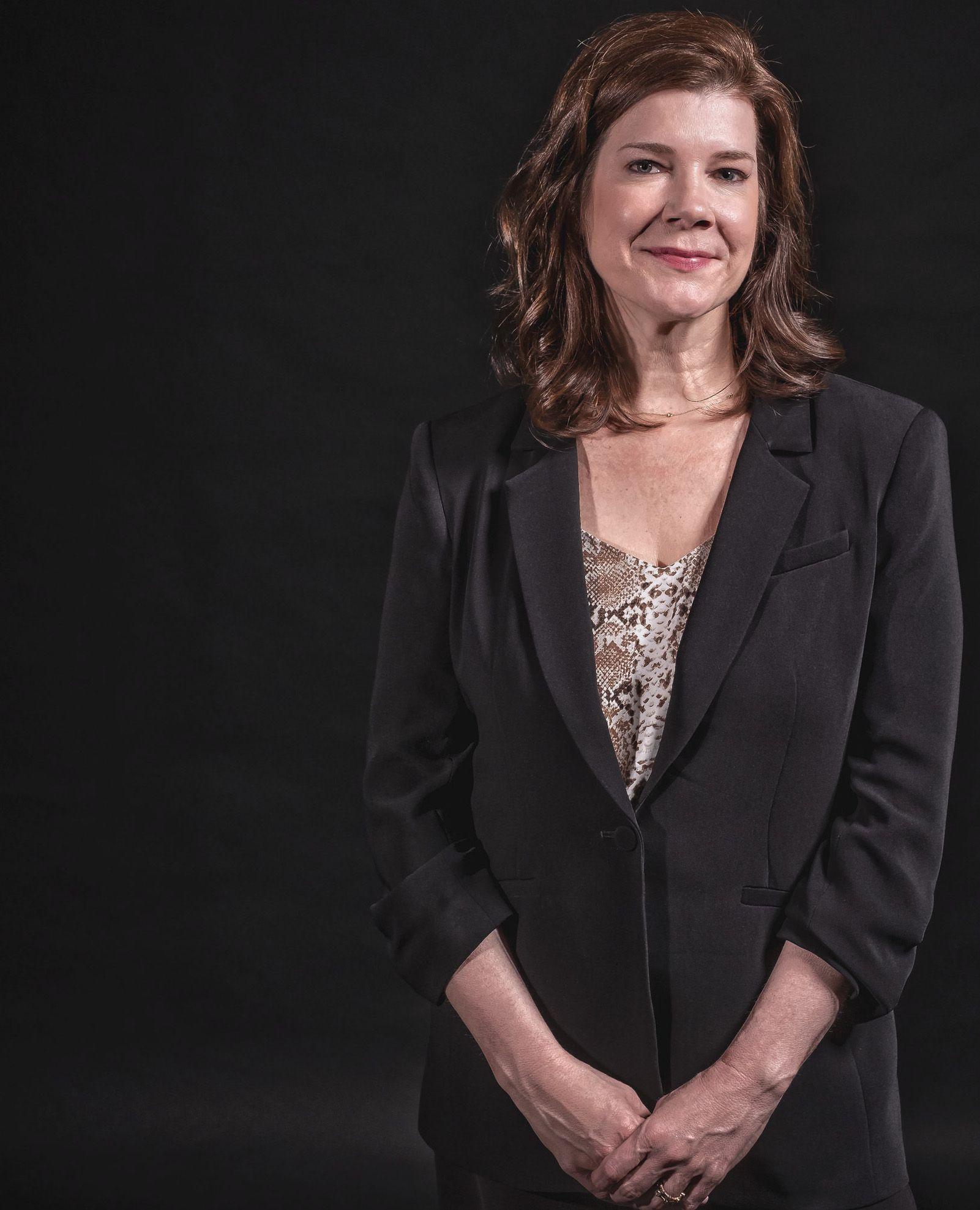
Robin Carson
CEO, Carson Hearing Care, Fort Worth Business: Hearing aids

At the core of Carson Hearing Care’s values are some simple tenets. No. 1: “Are we still having fun? What do we need to do?” CEO Robin Carson says. The second is remarkability. “When people leave this office, they remark about us to other people.”
Teamwork, passion, generosity (the company donates, for one, money from the sales of batteries to charity each month, runs events supporting pet adoption and adopts a nursing home during the holidays) and continuous improvement fill out the deck. “We are all taking from the community,” Carson says. “I feel this moral responsibility to give back to this community we’re taking from.”
Carson had worked years for other hearing care companies when she stepped out and opened Carson Hearing Care on Camp Bowie Boulevard in 2013. Faced with numerous other competitors, including clubs like Costco, Carson carved out a niche — that of more than just the initial sale of the hearing aid. The price of a hearing aid at her office includes lifetime care and maintenance. There are no fees for office visits or retesting. “We see you every four to six months,” Carson says. That’s part of the original price.
Carson doesn’t disclose sales figures but says they grew 5 percent last year. “I was disappointed I didn’t set my goal higher.” She hopes for 15 percent growth this year. This year, she brought on a fractional chief financial officer. Carson’s staff of as many as seven has two audiologists, including herself. “I need another provider. The next step is getting a third audiologist on staff.”
Mike Williams CEO, iReliev, Southlake
Business: Manufacturer and seller of pain relief devices and accessories

iReliev, a Southlake maker and seller of pain relief devices and accessories, has seen meteoric growth since Mike Williams, a longtime medical device rep, launched it in 2014.
Sales rose to $6.9 million last year, from $4.6 million the previous year. “The goals have been the same 40 percent, year over year,” Williams says. “This year, we’re up by about 20 percent.”
Williams had sold medical devices when he decided to launch his own company in 2009, selling personal health records software. The software became obsolete, but Williams had noticed the Food and Drug Administration had been changing regulations for certain over-the-counter electrotherapy devices. iReliev’s first product was a medical grade device that blocks pain receptors. iReliev today sells numerous OTC FDA-approved

pain relief devices, produced in Taiwan through a third-party manufacturer. Sales surged.
The business growth and iReliev’s differing distribution channels — the company sells direct-to-consumer and through retailers such as Walmart, Costco and Sam’s Club — made “for a very complex business,” Williams says. “It took a lot of work just to process an order.” So, he and his company spent much of last year bringing in software allowing it to manage the business and automate the back office, going live with it in January.
“I wouldn’t say we took a step back,” Williams says. “But we definitely took a lateral step. It’s been really about building infrastructure to support the growth. The solution was obvious. Getting there was going to be difficult. Everything was manual.”
CEO,
Business: Planner and producer of private parties, concerts, corporate conventions

Walter Kinzie was 7 when he took out his first business loan — $100, cosigned at the bank by his dad, for the purchase of a pig. Walter paid $50 for the pig; eventually put another $50 into food, supplies and fuel; and sold it for $200. “I did one every single year until I was 18.” Seven was about the same time he watched his dad run the entertainment for a county fair in Kansas. “I told my dad I was going to be in the entertainment business.”
At 18, Kinzie produced his first concert, a fundraiser for a friend who was terminally ill. Kinzie shortly after had to raise a pile of cash for himself when he fell ill with renal disease. Kinzie ran events, concerts and parties on the side of a retail job he had to pay off his medical debt, then entered the business full time in 2010.
Kinzie’s career as an event planner has had major milestones. He recruited The Eagles over 18
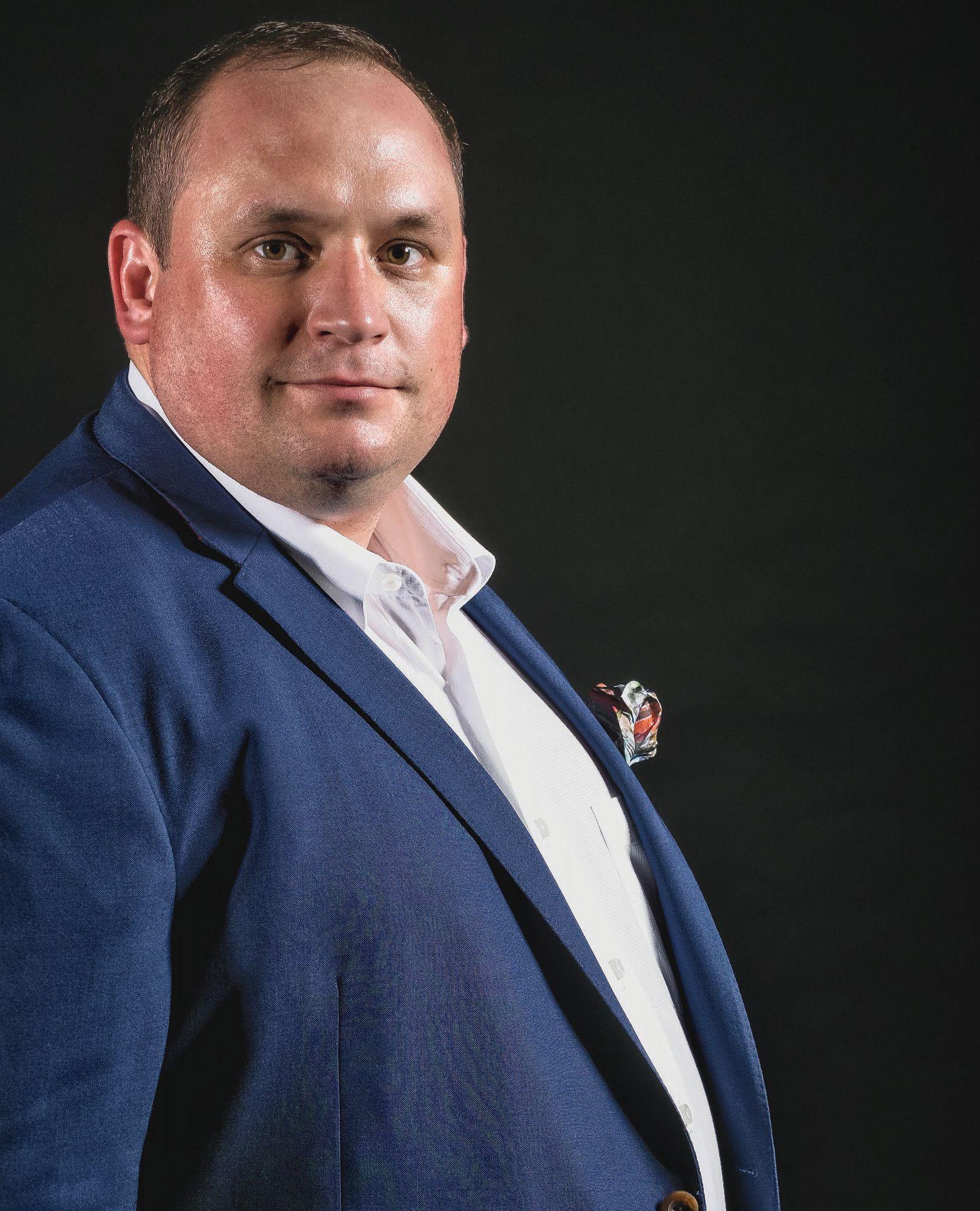
months to play a private party west of Fort Worth. He also ran a number of events and parties for President Trump’s inaugural. “We relocated our office out there for a couple of months,” he says. “The lift in business was phenomenal. It enabled us to narrow what we do.”
The company today has 30 full-time employees. Kinzie’s also launched a nonprofit, Guitar Project, asking musicians who play concerts and events he organizes to sign guitars for donation to major nonprofits.
Kinzie, now 35, doesn’t discuss his company’s financial performance.
“We fly under the radar here. I’m a poor farm kid from Kansas.” What are his growth goals? “We’re on a clear path to being the largest conference and convention company in the United States. We’ve got a lot of work to do, and we’ve got to a lot of competition.”
Roxanne Myers
General manager, Lost Oak Winery, Burleson
Business: Winery and events center

Lost Oak Winery has been growing since Gene Estes opened a tasting room in 2006 on 52 acres he owns in Burleson. His stepdaughter, Roxanne Myers, joined Lost Oak in 2007 and is the general manager today. The award-winning Lost Oak produces 10,000 cases of wine a year, and it has ambitions.
Lost Oak, in partnership with Brennan Vineyards of Comanche and McPherson Cellars of Lubbock, six years ago opened 4.0 Cellars in Fredericksburg. Today, Myers is interested in opening Lost Oak retail tasting rooms in North Texas and has looked at
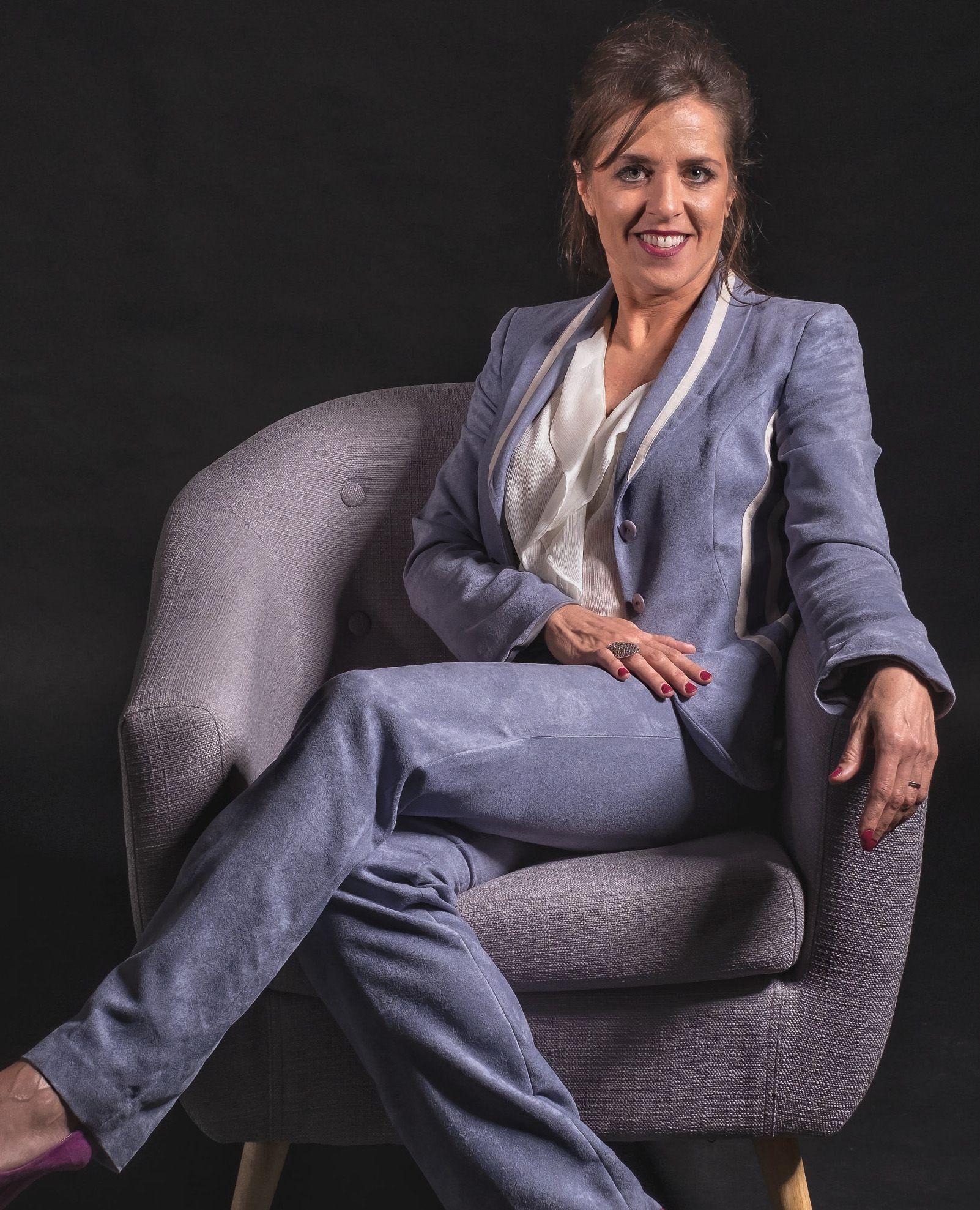
various locations, including ones in Dallas’ Bishop Arts District, Lakeside DFW in Flower Mound and Roanoke. 4.0 Cellars gets 2,000 visitors a week; Lost Oak draws 1,000 a month, she says. “I feel like I want to be in a neighborhood,” she says.
Lost Oak has expanded in Burleson since the original tasting room, adding a tank room, opening an events center three years ago, and expanding its production facility last year. The events business, which shot up within just a year, helped introduce people to the winery. Lost Oak also produces a small amount of its own grapes
on 5 acres at the Burleson winery and three off-site. That’s only good for about 5 out of 200 tons, but the vineyards on-site enhance the property’s image and visitor experience. Lost Oak invites visitors to hike the property and picnic, in addition to enjoying the wine and taking tours.
“We’re very friendly, very casual, very approachable,” says Myers, walking the property on a recent day in which Lost Oak had hired a mobile bottling vehicle to run a bottling at the winery. “We want to show people how the wine can taste and how good it can be.”

Sam Sameni
Partner, One Entertainment Group, Fort Worth Business: Owns and operates several nightclubs and entertainment venues, including Landmark Bar & Kitchen, The Yard Fort Worth and Texas Republic Bar & Kitchen in Fort Worth.

Sam Sameni remembers the first time he started to think like a businessman. His parents were in fashion, and the family lived in Iran for a time. As a teenager, Sameni would travel occasionally with his family to the U.S., and he’d return with sneakers he’d sell for a premium to friends in Iran. “Every time I would leave the country, I would have a list of things people wanted.”
Sameni eventually migrated to the U.S. for college at SMU in Dallas and got work as a bouncer at a nightclub. He eventually worked his way into management jobs at clubs. With one group, he helped open the Brownstone restaurant off of West Seventh Street in Fort Worth, then had to close it. “It was too early for this area,” Sameni says. “The food was unapproachable. Everything was overly complicated. There was no daytime and no weekday business for these restaurants.”
Finally, Sameni and another group formed One Entertainment Group, which owns five clubs and entertainment venues today, including three off of West Seventh Street in Fort Worth, and does about $17 million in annual sales. One Entertainment opened the Landmark Bar & Kitchen in 2014. It started The Yard venue last year. Texas Republic Bar, another of the clubs, opened in 2017 with former Waters executive chef Clint Connaway over its kitchen. Earlier this year, Texas Republic debuted a rooftop bar. Texas Republic also offers a VIP bottle service. One Entertainment also promoted its second annual Fort Worth Margarita Festival in April, with 15 margaritas vying for a top prize; the Yard hosted this year’s one-day event.
Sameni attributes the company’s success to focus on fundamentals and not giving away the store, the death knell for many bar owners. “For us, it’s a business. A lot of nightclub owners are in for the wrong reasons — for the girls, the drinking.”
Rich Herbst CEO, Ascend Marketing, Grapevine Business: Marketing agency

Rich Herbst had enjoyed a long corporate career but had the itch to try an entrepreneurial venture. “I reached a point in life where if I’d stayed on a corporate track until retirement and looked back, I’d have regretted it,” he says.
Herbst and a partner made the jump, launching their marketing agency in 2004. “It took us a couple of months,” Herbst says. “I had some momentum going.” Today, the company focuses on the customer experience and journey across multiple channels.
In 2014, Ascend bought Yellowfin Strategy + Design, significantly enhancing its brand and digital design capabilities.
Ascend has 60 people today in Grapevine and Austin and

around the country. It made the Inc. 5000 list of fastest-growing U.S. companies in 2018, based on $8.1 million in 2017 revenue and a 177.5 percent three-year growth.
“We’re trying to live into a vision, and that’s to be a leader in journey marketing,” Herbst says. “You’ve got to light up a lot of channels.”
For one large telecom client, Ascend refined and automated the customer journey across the life cycle, from shopping to purchase, installation, onboarding and loyalty experience. Herbst wants to recruit several larger clients that are deep into journey marketing. “We’re not there yet.”

Matt Bowman
CEO, Thrive Internet Marketing, Arlington Business: Digital marketing

Matt Bowman matter-of-factly summarizes Thrive Internet Marketing’s history since Bowman founded it in 2005: “We started as web design. Then we said we can be a legit [marketing] company in DFW. We’re at the stage now where we say we can be a top agency in the United States.”
The company continues its sharp upward trajectory. Last year’s sales were $6.3 million, Bowman says, double the previous year’s. This year, he expects Thrive to hit $12 million in revenue.
At mid-2018, Thrive launched RIZE Reviews, a service that lets businesses manage reviews and online reputation. Bowman says RIZE will help double the company’s sales this year. RIZE generated 15,000 reviews in five months for one client, a multi-location restaurant chain. RIZE has helped another client, an energy company, secure 700-800 reviews in five months, Bowman said.
Thrive has expanded into other Texas cities, including Houston, Austin and San Antonio. It’s also eyeing Florida, where its operations director and a dozen Thrive employees live, as its second state to expand into. Thrive wants to pursue more franchise companies as clients. “We’re still to grow by bigger chunks,” Bowman says.
Bowman says broader national recognition for the company’s success still is somewhat surprising. “We’re starting to be recognized as a U.S. agency,” he says. “I’m getting used to it. I’m still just the guy from Arlington.”
David Canington Owner, Ardent Creative, Fort Worth Business: Creative agency

David Canington had an unusual start to his entrepreneurial career in creative work. Canington was a high school dropout who got a GED, tried college but had to come home when his dad suffered a heart attack, and waited tables and sold cars to make a living. “I did really well selling cars.” He pitched the boss at the Durant Toyota dealership he was working at on an advertising idea: Ship a welcome box to all new Toyota buyers, including two coffee mugs, DVD, a survey customers could fill out for a free oil change, and a short video Canington would produce introducing the customer

to people at the dealership. “I pitched him, would you be my first client,” Canington says. “Car companies would spend $50 to send a branded calendar. I could produce and ship the boxes for $6 to $10. [Durant] did it for several years.”
Canington left Durant and set up his firm, offering graphic and web design and grossing $12,000 the first year. An apartment complex hired him to build a website. Canington confessed he’d never built a website. “I said yes and will charge you if you’re happy. That’s how we approached several things.”
In 2005, Canington and frequent col-
laborator Brad Ball merged their two creative firms, forming Ardent. “I was technical; he was creative,” Canington says. When the recession hit, Canington says, “a lot of the things we didn’t know kind of saved us.” For one, “we didn’t know you had to have account managers. We sold the fact that the client would bypass the hierarchy.” Even today, “we don’t have all of those levels.”
Canington says Ardent “always tries to find a way to break the rules of how it’s done.” He marvels at his start in the business. “This whole thing, what I do, I have zero background.”
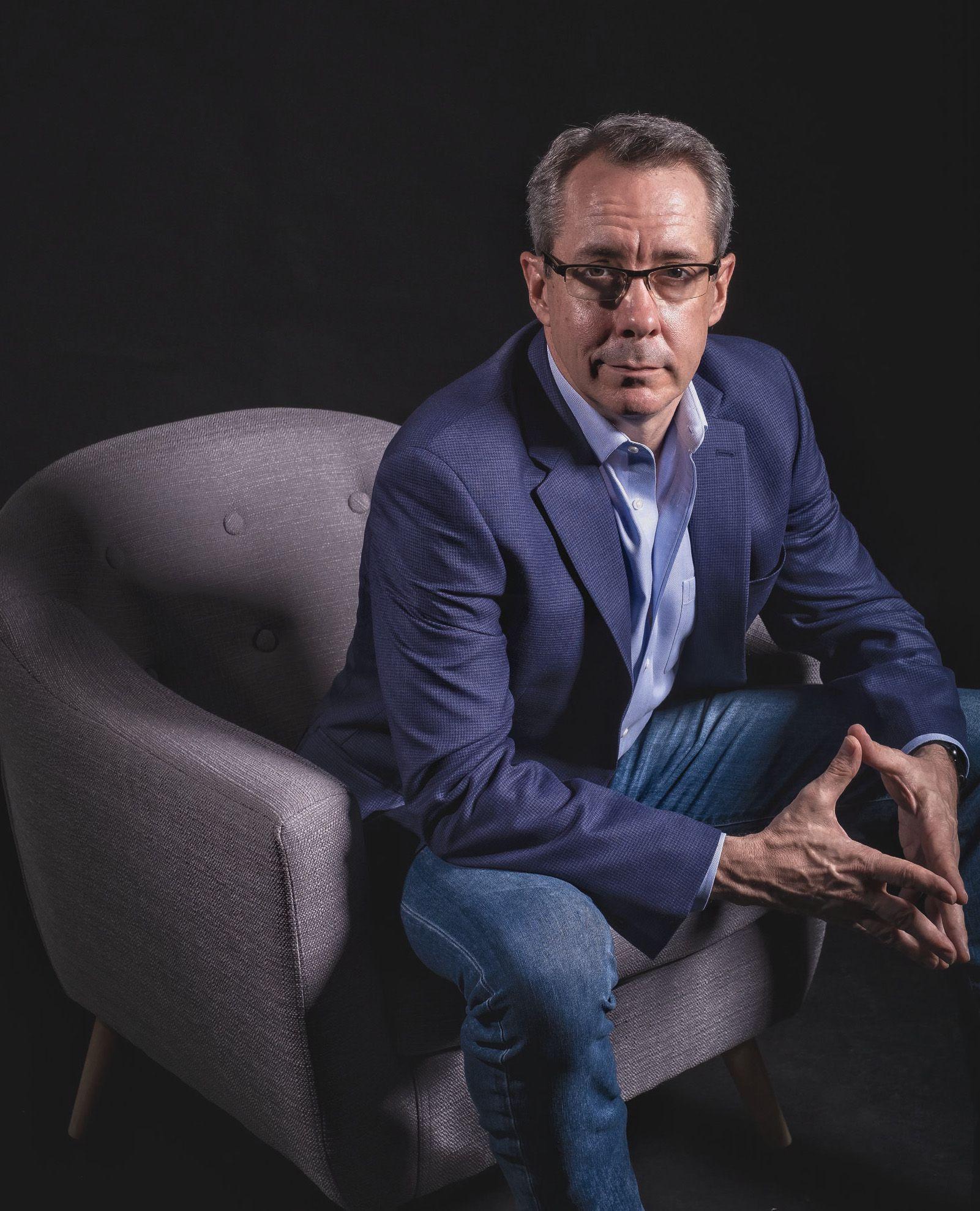
Mike Coffey CEO, Imperative Information Group, Fort Worth Business: Background investigations

Mike Coffey likes to say he caters to clients who “can’t afford a cheap background check.” Coffey, who came up in human resources, launched his background investigations firm 20 years ago after being called in to consult on a big internal theft.
Coffey, who obtained a license as a Texas private investigator, bootstrapped the startup with no investors. “There were a lot of times where it was all on me to make things happen,” he says. In 2009, after the recession hit, he laid off all but one of his 10-11 employees.
“By the end of summer, I hired everybody back who I wanted. I grew up that year a lot.”
Today, he caters to small and midsize businesses, family office, health care, oil and gas, accounting firms and high net worth clients. “Eighty percent of the market is fast and cheap,” he says. “We cater to companies that have to get it done right, who can’t afford a bad hire.”
Imperative’s software runs management of the background check. Clients can order online. The system manages work flow and can make assignments, such as sending an investigator into a courthouse to check documents. “If you have 25 elements in the background check, it just slices and dices.”
The company’s goal is a definitive background check that has no ambiguous information that forces the client to call Imperative with a question, Coffey says.
The company last year bought a competitor in California that runs background checks on prospective nannies, a new segment for Imperative. “All over the country, we’re doing these background checks for nannies; I hadn’t thought of it.”
Coffey spends a lot of time speaking to groups about various topics. One is the potential value in a job prospect who has a criminal background. Too many employers say they do hire people with criminal backgrounds but on a “case by case” basis. “What that really means is you’re going to introduce a lot of your own personal bias in it. Let’s evaluate for a specific type of job.”
Justin Sisemore
Attorney, Sisemore Law Firm, Fort Worth Business: Divorce law

Justin Sisemore’s not shy about seeking mentors. When he was coming up as a lawyer, Sisemore started following other lawyers, dropping in on them when they were before court.
“I’m not going to pretend to be the smartest guy in the room,” Sisemore says. He used that strategy as he built his firm, hiring staff. “I started hiring all of my weaknesses.”
Sisemore today is one of Fort Worth’s most wellregarded divorce lawyers.
Larger firms in Fort Worth often use Sisemore as a resource, where divorce is involved. Sisemore’s also expanded his firm’s reach by creating platforms, using his firm’s infrastructure, for lawyers who are approaching retirement. “We manage the caseload; you get to fly your flag at the end of your career,” Sisemore says. “We get to expand our brand.”
Sisemore’s firm has six lawyers, plus Sisemore.

Sisemore grew up at the feet of his mother, a “great lawyer [who] didn’t like to delegate.” Sisemore also uses a systematic approach to his cases that ensures his clients are protected through temporary restraining orders and mediation proceedings. “Ninety percent of cases settle in mediation,” he says. “I don’t like cases that drag on.” Cases can drag for various reasons, including the involvement of children, dispute over a family business, and a spouse who wants to drive the value of a business down. “You’re doing deals.”
Sisemore’s business background helps in divorce cases, he says. He has a finance and entrepreneurship background from Baylor University. And he and his wife, Evin Sisemore, also last year purchased Texas Motive Solutions, which sells and services Hawker battery products with exclusivity in Texas.
Anna
Summersett Partner, Varghese Summersett, Fort Worth Business: Criminal defense lawyer

Anna Summersett says she knew early she wanted to be a trial lawyer. “That naturally means be a prosecutor.”
Her first job out of the Texas Wesleyan School of Law was as an assistant district attorney in Cameron County in South Texas, where prosecutions of drug cartel members led to death threats against the district attorney’s office. “Our cars were showing up on websites,” Summersett says. Her second job was as an assistant D.A. in Tarrant County, where she met her husband-to-be Benson Varghese.
Both were interested in exploring
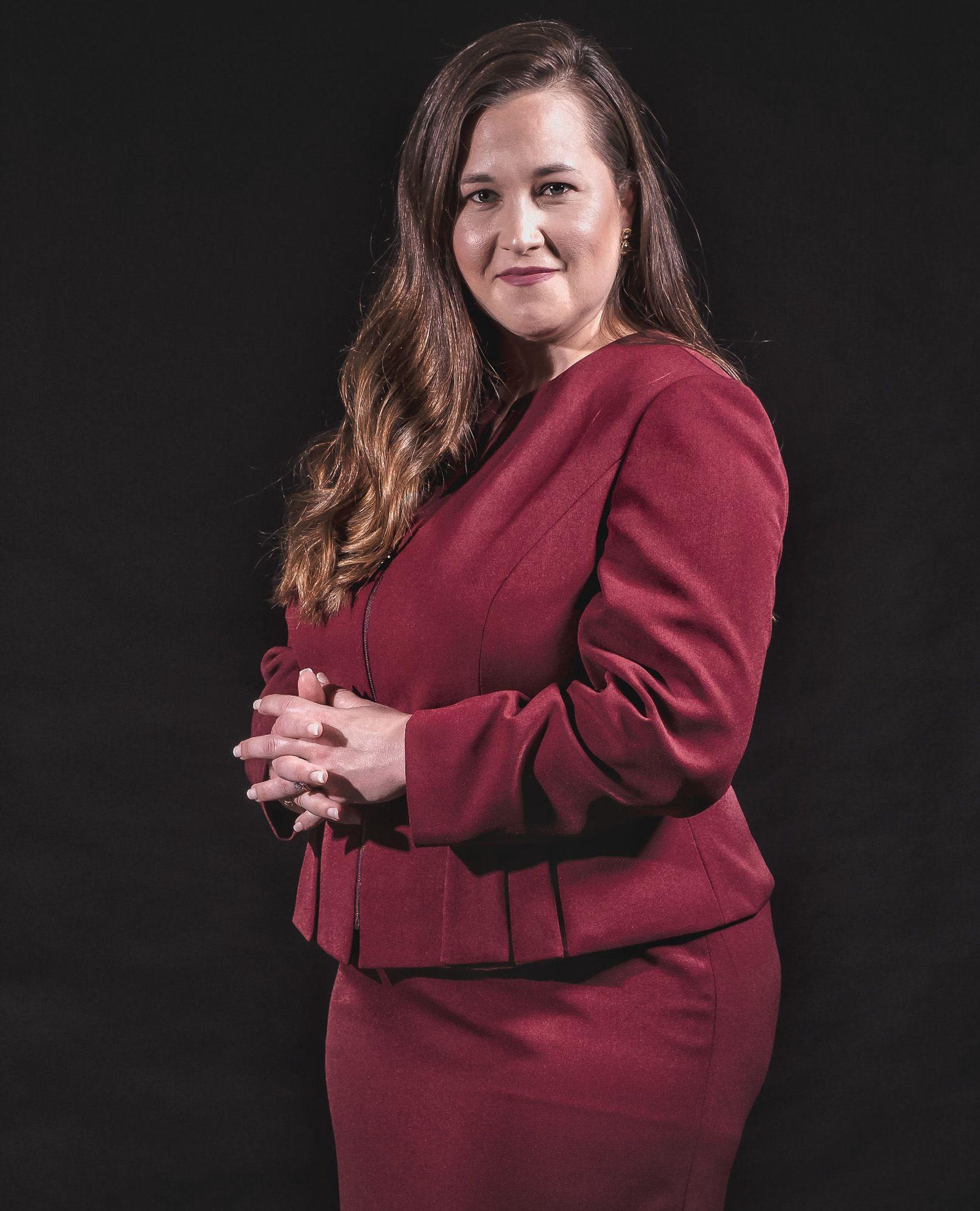
criminal defense. “We thought [police and prosecutors] always wore the white hat,” she says. But not always the case. “There are law enforcement who make mistakes, prosecutors who make mistakes.”
Varghese jumped first, leaving the D.A. to start a criminal defense firm in March 2015, and making his mark initially by writing voluminous articles for the firm’s website, offering free insight and meeting many potential clients online, where they were searching for information. “Fort Worth is a big small town,” Summersett says. “People are going to be online for at
least basic info.” Summersett quit her job at the D.A. and joined the firm in November 2015.
The firm is flexible in its approach to clients. “We can run a full case, start to finish, remotely if that’s what the client wants,” Summersett says. “We’re trying to remove all of that inconvenience.”
Varghese Summersett has also become home for some noteworthy Fort Worth criminal lawyers — the firm has eight lawyers — who want to practice but “don’t want to do the business side,” Summersett says.
John Staab CEO, Motive Real Estate Group, Fort Worth Business: Residential real estate brokerage

John Staab had a long career in real estate, finance and hedge funds. “I enjoyed it, but I knew there was something missing,” he says. “Something was missing if I were to start a business. I boiled it down to a giving component. That was what was missing.”
Staab, licensed in real estate for more than 16 years and always drawn by the people, started Motive Real Estate in 2016 with a small team of what he says are five “like-minded agents.” The firm’s giveback that Staab scouted out: Build a modest home in Africa for every one the firm sells here. The agents loved that, Staab says. “Not only do the agents buy into what they’re doing, but I find it’s influential in getting clients.”
Staab estimates Motive has built 70 homes so far. “It’s always moving.” Staab teamed up with a British nonprofit “NGO” that’s worked in Zam-

bia for years, paying to build and then donating a home to a family. “I wanted to make sure I could execute a one-forone giving program,” he said.
The homes are in a remote village. Recipients typically are elderly or grandparents caring for orphans, grandchildren, nieces and nephews, Staab said. The homes typically are no larger than a 15-by-15 footprint, he said. The interiors are treated with chemicals that keep mosquitoes away. The houses do not have indoor plumbing, and residents cook over open flames, Staab said.
Staab declined to say what the houses cost.
He said funding for each house is the first expense subtracted from sale proceeds of homes Motive sells. “I would love to find another organization in this hemisphere where we could do the same thing,” Staab said.
JP Piccinini CEO, JP and Associates REALTORS, Frisco Business: Real estate brokerage

JP Piccinini’s thought, when he leapt into residential real estate sales, was fairly small. “I just wanted a couple of agents, maybe a team of 10-12 agents.”
He’s outstripped that. His residential real estate brokerage has about 2,000 agents today, up from 1,000 a year ago. Piccinini expects the firm will close on $3.5 billion in sales this year, up from $2.8 billion last year and $1.7 billion the year before. Transactions are expected to rise to 15,000 this year from 12,000 last year. “I haven’t sold a house in about five years,” Piccinini jokes. “I was responding to my agents faster than I was my clients.”
Piccinini expects to expand J Par’s reach through the sale of franchise offices outside Texas. Franchise packages carry a

$25,000 franchise fee, plus royalties. Franchisees get to use J Par’s system and back-end capabilities and leadership training. The company has sold 20 franchise offices. “I’d like to get to 50 by the end of the year.”
J Par charges agents a flat $500 fee per transaction. “We don’t care if they’re selling a half-million-dollar home or a milliondollar home,” Piccinini says. Agents can buy extras, like leads, swag, print material and technology upgrades. “There are a lot of different options,” he says.
In the future, Piccinini says he can see taking the company public. “We do envision in the future going public once we hit 20,000 agents.”

Ty Williams
Broker, president, RJ Williams & Co. LLC, Fort Worth
Business:
Real estate brokerage

Ty Williams bought his first home at age 18 using a settlement from a car accident he was in. “A couple of friends moved in with me. They helped me fix up the house.” He sold the house for his first flip. “And we just kept going.”
Today, Williams’ wife, Carmen, helps in the flips, and the couple is doing a flip project in Dallas. Williams, licensed as a Realtor in 2011, went to work for an agency before ultimately founding RJ Williams & Co. in 2016 after his father. The agency, based on Fort Worth’s Near Southside, is in commercial, multifamily, retail and residential properties, with a focus on residential. “Our focus is trying to get everybody into a home,” Williams says.
Williams serves as noncompeting broker in his agency. “Any complex situation that comes up, that’s what I’ll do,” he says.
The agency is actively involved in Habitat for Humanity, encouraging agents to volunteer in a couple of builds each year because Williams’ wife grew up in a Habitat home in Dallas, Williams said. “If you’re doing right by people, then good things will come to you,” Williams says.
As for growth goals, “I’m living the dream every day,” Williams said. “I want it to be smart growth over time.”
Will and Leslie Bannister
Principals, Clarity Homes, Fort Worth Business: Homebuilder

Will and Leslie Bannister saw a niche in the homebuilding market 21 years ago when they founded Clarity Homes. “We saw a need of affordable luxury in the marketplace, and that’s what we’re still doing today,” Will Bannister, who was working for a homebuilder, says. The timing was a little problematic. “We planned our wedding, and we planned the company,” Leslie Bannister says. “He quit his job.”

Clarity has built homes ranging from $200,000 to $3 million in Fort Worth, Godley, Burleson, Denton, Argyle, Justin, Aledo and Benbrook. Clarity owns lots in 10 neighborhoods, but it also works with a client’s lot and plans.
The company, which has 20 employees in its Fort Worth office, operates within a small number of core values: Champagne Tastes/Beer Budget, Make It Happen Now and We Clean Toilets. “We want the cham-
pagne even though they’re on the beer budget,” Will Bannister says. “We focus on time is money,” Leslie Bannister says of Make It Happen Now. “Our subs and everybody who works for us know time is valuable. We don’t waste it.”
The Bannisters are optimistic about the markets. “We continue to see big growth,” Will Bannister said. Universities are growing and incubating new graduates, the Bannisters said.

Sean Knight President, owner, Sean Knight Custom Homes, Aledo Business: Custom homebuilder

Sean Knight has been working on houses for money since he and a friend started a roofing company when they were attending Western Hills High School. Knight had a framing company when most kids were getting their diplomas and was doing remodels in his early 20s. Knight’s been a certified master builder and remodeler since 1996.
Knight, who’s building our sister Fort Worth Magazine’s 2019 Dream Home in Walsh, estimates he builds eight to 10 homes a year. These days, besides Walsh, he’s building in Mira Vista, Monserrat and surrounding areas. “You’re getting a control freak,” Knight likes to tell prospective buyers up front. “We don’t want issues,” Knight says. “We want to be as transparent as we can be. If Sean tells you, it’s going to happen.”
Knight likes to tout the creds he earned from his hammer-swinging days when he’s reassuring a potential customer or one who’s bought. “Physically, I can build a home,” he says. “I know how all of it works. I can put a tool belt on.” Knight runs a lean office with a designer, office manager, project manager “and me.”

Robert Whittaker CEO, Magnolia Fence & Patio, Fort Worth Business: Fence and patio

Robert Whittaker’s spent a lot of time lately working on making his fence and patio business run more efficiently. There’s this: He fears his employees rely too much on him to make decisions and don’t act autonomously when they could. What’s the fix for that? “This is no joke,” Whittaker, the founder and CEO, says. “I don’t show up to work. Don’t come in mornings. Leave at 3:30. Now, I’m still working my tail off.”
The payoff for the extra time he’s had by himself: Whittaker was able to refinance some debt, lengthening the term without having to pay more in finance charges. “Anybody can build a fence, but can they run a legitimate business?” he says.
Whittaker is making a number of other changes to boost net income. Whittaker doesn’t expect the company’s sales, $6.5 million last year, to increase this year. “I just want to see that net income increase,” he says.
Changes include upgrading information technology; bringing in shipping containers that crews can use to store tools, significantly reducing loss; and storing materials inside, also paring loss. He’s also installed cameras and moved the company’s welding shop to the main plant on Fort Worth’s Southside. “I’m going to throw every dollar I can to make sure we have the infrastructure,” Whittaker says. “We’re trying to solve all those things so the business can be more professional.”
Sunny Lowe CEO, Blue Jean Networks, Fort Worth Business: IT service and support

Sunny Lowe likes to say he’s at the point in his entrepreneurial journey where things are no longer about him. “You get to the point where it’s about them,” he says.
At Lowe’s Blue Jean Networks IT company, which he founded in 2008, sales rose to $2 million last year from $1.5 million the prior year. This year, he expects sales to grow again to $2.4 million. “We’re not buying other companies; it’s just organic growth,” he says. In June, Lowe is moving his company’s headquarters on South
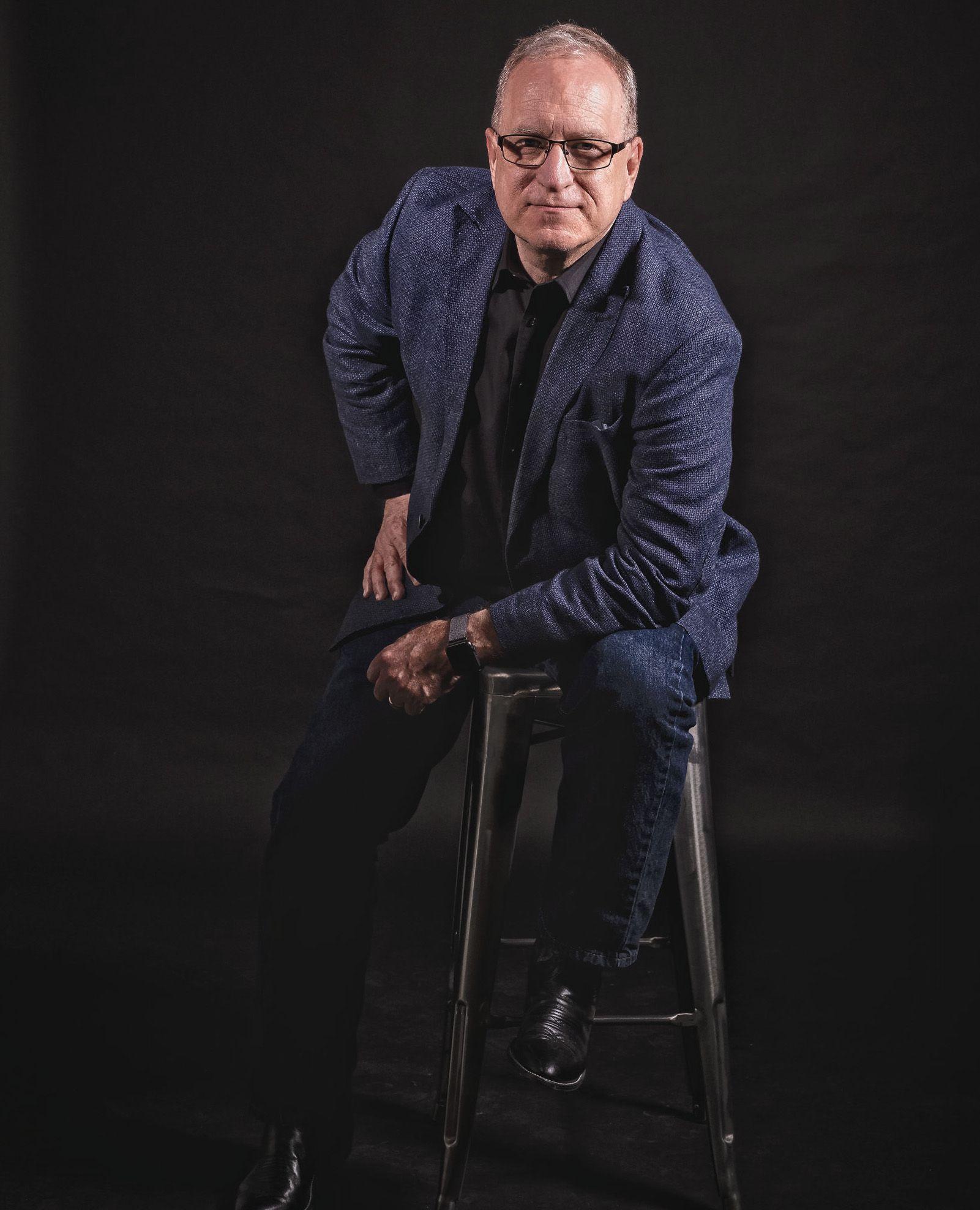
Hulen Street to another building nearby, where he’s doubling his office space to about 5,000 square feet. The staff is growing, from four last year to today’s 14 and probably by another four this year, Lowe says. “Our people are staying a long time, too,” Lowe says.
Adding new clients and growing organically helps. Lowe offers bonuses to employees who are buying homes. Lowe’s noodling on the question of how the company can make its clients the heroes. “If the business owner makes himself the
hero, he ends up the weakest person in the story,” he says.
And as long as Lowe’s following the story he’s in the middle of, “when I look into the future, I see a world where the PCs and servers are in the cloud; you can get to your tools and data anywhere in the world,” he says. “Everything scales at an affordable price. We end up with entire offices that can put their PC networks in the cloud. That’s going to change how people work. The cost of technology will come down. Imagine never having to buy a PC again.”
Rishi Khanna CEO, ISHIR, Plano Business: IT

Rishi Khanna has been writing software code since he was in third grade in India. “Simple codes to solve simple problems,” he says. “The idea is to think enough through the problem and how you solve it by breaking it down.”
No surprise, then, that Khanna ended up in software. Graduating from the University of Texas, Khanna went to work for Deloitte, where one of his managers

suggested he start a company. “I had an entrepreneurial mind. I had endless desire to do more.” In 1999, just ahead of Y2K, Khanna went to Best Buy, bought himself a laptop and started an IT outsourcing company called ISHIR. He spent two months in India recruiting talent. “The first year was really tough.” But he made another push. “I decided to give it another shot. I never looked back. I put everything I had in it.”
Today, ISHIR is in IT outsourcing, digital marketing and artificial intelligence; the three enterprises have more than 100 employees. ISHIR does about $2.5 million in annual sales, and the EN08 AI company does about $2.1 million, Khanna said. He expects ISHIR to grow to $5 million in sales next year, and EN08 to about $8 million. “We want to be doubling by next year.”

Igor Motkin
President, Weby Corp., Arlington Business: Firearms and outdoor gear through Amazon storefront, bricks-and-mortar stores 1800gunsandammo.com and RunUnited in Arlington and Mansfield, and eponymous websites

Weby Corp. has been named for five consecutive years to the Inc. 5000 ranking of fastest-growing U.S. companies. But its owners — President Igor Motkin, CEO Mikhail Orlov and partner Alex Grigorenko, who came aboard after Motkin and Orlov founded the company in 2010 — plan to focus this year on what Motkin calls “even higher quality.”
That means expanding in higher-margin items; guns, for one, do about 15 percent profit margins, while footwear and apparel 50 percent, Motkin says. Weby Corp. did $50 million in sales last year and has been running 20 to 25 percent annual sales growth. This year, “if we do 55, that will be good enough.”
Weby has its roots in the Belarusian Motkin’s dream of emigrating to the U.S. When he was 26, Motkin’s wife won a green card lottery to come to the U.S. Motkin, who was working for a company making high-end optical equipment used in research, reconnected with Orlov, a businessman he’d interviewed with at a firm that was making night vision optics in Belarus. Orlov offered Motkin a job in sales at an American distributor it owned in Mansfield. In 2009, Motkin and Orlov left the company and founded Weby Corp.
The two learned much of their web-based business for high-end optics was coming from Russia, so they won a U.S. license to export those products to Russia. Popular American sporting goods retailers weren’t in the business.
The partners expanded into firearms and gear for camping, hiking and fishing, offering well-known brands. Orlov, a runner, wanted to be in running, so the company expanded into running. The company operates a 1800gunsandammo.com store in Arlington and a RunUnited store in Mansfield. It expanded onto Amazon in 2012. Web sales, including Amazon, account for 75 percent of business today, Motkin says. Of that slice, at least 85 percent comes from Amazon.

Derrick Potter
President, Firefighting’s Finest Moving & Storage, Fort Worth Business: Moving and storage services

Firefighting’s Finest has grown up quite a bit since Fort Worth firefighters Derrick Potter and Pat Dodson started it in 2001. For one, it was a lot easier to find off-duty firefighters who wanted second jobs then, Potter says. “You just don’t find that these days. We’ve got a few firefighters.”
Potter and Dodson rented a truck to start the company. Today, the company has 40-45 pieces of equipment and four locations in Fort Worth, Houston, Dallas and Austin. The 150-160 employees are largely professional movers, Potter says. “We’ve really transitioned more into helping our employees provide for their families.”
Firefighting’s Finest revenue hit $12 million in 2018. “When you get to that point, you can’t do things the way we used to then,” Potter says.
Firefighting’s Finest’s operation is much more professional, too, offering warehousing in Fort Worth and Dallas and building warehousing in Austin. Potter started another company on the site, Derrick Potter Ventures, or DPV, which owns the Fort Worth and Austin properties, but not the one in Dallas. DPV leases the sites to the moving company.
Randy Lyne
President and CEO, Preferred Pump & Equipment, Fort Worth Business: Top North American distributor of water well pumps and equipment

Randy Lyne’s entry into business ownership came from a former employer who helped him get started to take advantage of an opportunity. “I had no money whatsoever,” Lyne, who had been in the water well pump business, says.
“We leased a warehouse, and I shared it with them, and I bought from them.” He subsequently moved the company to Dallas and then to Fort Worth in the early 1980s.
Lyne’s Preferred Pump today has 53 branches nationally and 600 employees, including 50 at its East Side headquarters off of Beach Street and Interstate 30. Preferred Pump sells to contractors who drill

water wells to customers, such as agricultural.
At $400 million a year in sales, Lyne estimates he has a leading 35 percent market share nationally of the $1.3 billion U.S. industry, although a stout competitor is in the market behind him.
“Our margins have gone down,” Lyne says, attributing that to low growth, decline in rural area and fewer pumps.
Preferred Pump promotes its business aggressively to its clients, taking 800 couples annually on a cruise or to a location like Maui, and 1,000 couples every year to Las Vegas. “Seventyfive percent of our customers have been on these things before,” Lyne says.
Douglas Pignatelli
President, SKU 2 U Fulfillment, Fort Worth Business: Fulfillment centers

Doug Pignatelli’s entry into fulfillment came off of a joke. He was working for a nutritional products company when his boss began looking into buying another nutritional products concern. The men were analyzing the profit and loss statement when they arrived at the $10,000-permonth line item “fulfillment.” “We didn’t know if that was a lifestyle thing the company was offering,” Pignatelli says. Learning what fulfillment was, Pignatelli suggested to his boss that they should consider bringing it in-house to modernize
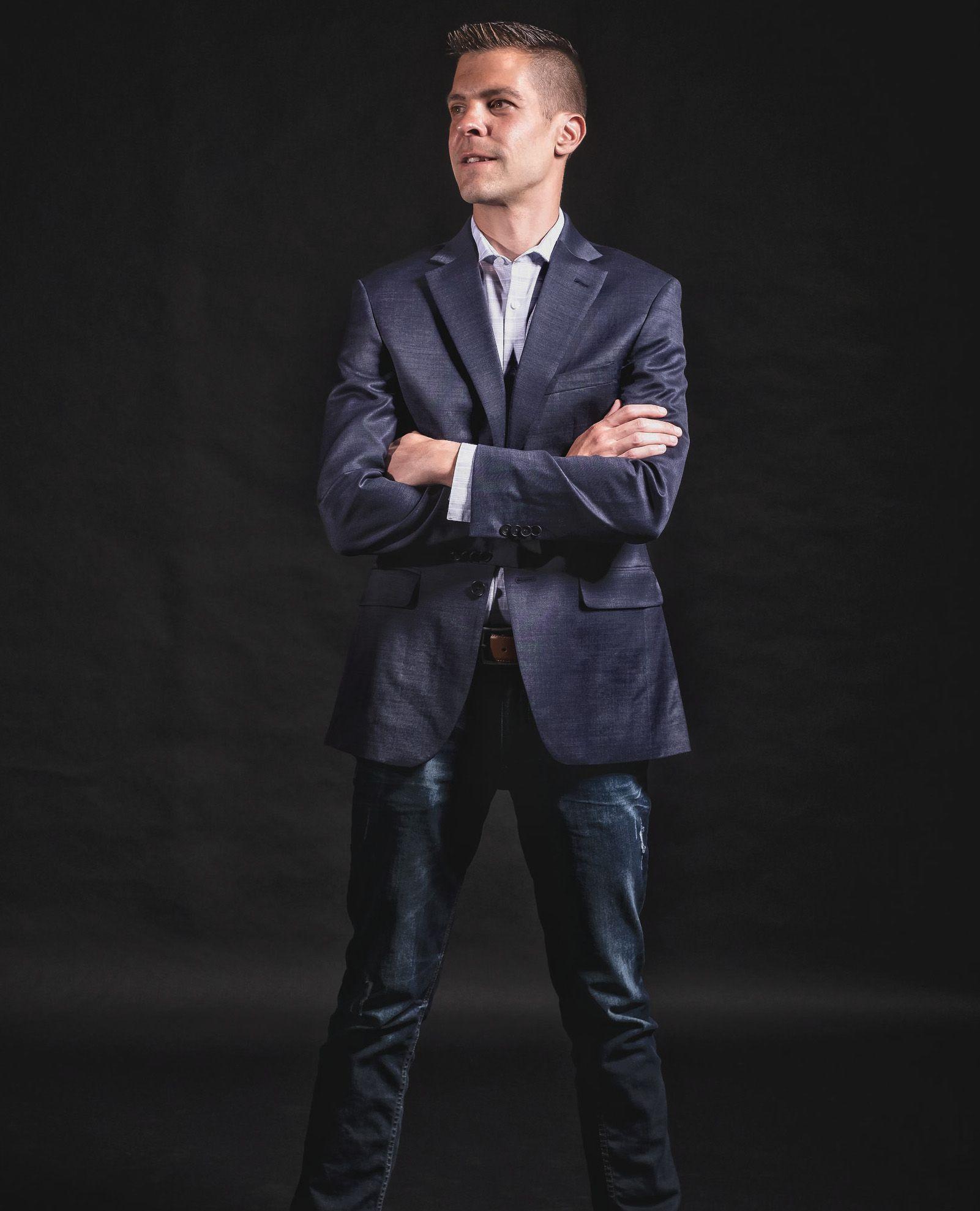
their outmoded, manual system. Pignatelli’s boss responded he didn’t want the headache of employees. “I joked that you pay me $10,000 a month, and I’ll do the fulfillment for you. [He] said yes.”
Today, Pignatelli’s SKU 2 U Fulfillment has fulfillment centers in Texas (two near DFW Airport), Ottawa, Korea, Mexico and Spain. Pignatelli is sole owner, having bought out the partner whose mother had given the partners a $20,000 starter gift. He estimates he has 200,000 square feet of warehouse under roof. Pignatelli attributes the logistics
and technology know-how to employees. “I’m technology dumb,” he says.
SKU 2 U has 130 employees companywide, including 50 at the Fort Worth headquarters. The company’s headquarters fulfillment center, south of DFW Airport takes in about 10,000 orders per day; companywide, SKU 2 U processes about 15,000 orders. The company’s niche is direct to consumer. It does a lot of “kitting” — assembly of components into a package to be shipped out. “Everybody has a niche,” Pignatelli says.
Recipient / Supporter


Beginning with this year’s Entrepreneur of Excellence awards and in future years, Fort Worth Inc. is presenting a special Supporter of Entrepreneurship award to a deserving friend of entrepreneurship in the area. This year’s recipient is Darlene Boudreaux, retired executive director of the Tech FW incubator and founder of the Cowtown Angels investing group. Boudreaux, who built her own contract pharma company before selling it, has nurtured numerous life sciences startups through Tech FW. She’s just accepted a post as chief financial officer for BioNorth Texas Inc., which exists to drive economic growth in North Texas by connecting the life sciences industry for the 26-county region.
Boudreaux, who’s also
joined the Cowtown Angels as an investor now that she’s free of ethical constraints she’s had as Tech FW director, sat down for a Q&A with Fort Worth Inc.
Here’s one of the Qs and its A. Please see our website, fwtx.com/business, for an extended conversation with Darlene.
Retaining our life sciences startups
Darlene: “I’ve been saying for years I can get these companies started here. The problem is, will they stay here. When they outgrow one office space at Tech FW, they’re not ready for a 100,000-square-foot warehouse. The problem is, these clients are too small for anybody to pay attention to. I’ve been pushing the city for years to figure out how to build something [that could be shared warehouse].”








M-Pak, an Aledo retailer of packaging and tactical gear, wants to quadruple sales in the next five years. Founder Debbie Cooley, an Entrepreneur of Excellence alumna, was a reluctant entrepreneur.
BY TERESA MCUSIC / PHOTOGRAPHY BY OLAF GROWALD
Debbie Cooley says she was a reluctant entrepreneur. But her “never-give-up” spirit — learned while watching the Cowboys growing up in Dallas — and her bump on the glass ceiling where she ran the most profitable division while earning less than half of her co-workers, led her to the conclusion that to make it, she had to go out on her own. She took her clients (after realizing she had never signed her noncompete clause) and started M-Pak Inc. in Aledo. Now celebrating its 20th anniversary, sales were $12 million last year with 15 employees in three locations. Clients include the federal government and Lockheed Martin. The 66-year-old has ambitious plans to hit $50 million in five years as her company — a retailer of packaging, tactical clothing, uniforms and safety gear lines — pushes for international clientele and product improvements. Her end goal? Leave the whole thing to her daughter, Anna Boulware, vice president of M-Pak.
Size Matters “I feel like M-Pak should be three times as large. The first couple of years, my mark on my calendar was just getting my daughter through college at TCU; then I was going to figure out what I wanted to do with my life. I’m not a detail person, and the thought of sitting here doing accounting was not for me. But by the time she got out, we had grown substantially — we were well over a million in sales — so I thought, well, OK, and I reluctantly learned how to do accounting.”
of Not Taking Risks “Had I thought that this was going to turn into something, I would have made different decisions initially, but I was laying low, not taking any risks.”
Next Gen “My daughter is my exit plan. Sometimes she thinks about selling it, but I tell her to think about it. If the company is making a boatload of money, do you want to get rid of that boatload?”
Going Green “We’re testing green coolers. They biodegrade in seven months, and they’re made out of Styrofoam. The federal government keeps wanting to go green. We’re always trying to innovate and make other products better.”
Leg-up as a Women-Owned Business? “That’s a big myth, a huge myth. The Small Business Administration builds that up. All things being equal — if it’s penny for penny — we’ll probably get the contract. Every now and then, they’ll have an incentive for a certain group — veterans, Hispanics, etc. — they’ll put a 10 percent marker on that. But that’s usually the smaller contracts. They’re not going to spend half a million more on a contract because of someone’s gender or ethnicity. Corporate diversity departments also are a
big smoke screen. You think they would help you get in and at least take a meeting, but they don’t.”
Perseverance “I lost my first federal contract. But when you lose, they send you details on the winning proposal. After that, I knew what to do and have been successful in government contracts since.”
Had I thought that this was going to turn into something, I would have made different decisions initially, but I was laying low, not taking any risks.
One of a Few “EO has about 10 percent women. Their tag line is ‘To Boldly Go.’ That’s what made me want to join. Sometimes I don’t feel bold enough because back in my day, we were supposed to be polite and only speak if we’re spoken to and our hair bow matched our shoes. I think I hesitate sometimes. I need to be bolder.”
Teresa McUsic is a Fort Worth-area freelance journalist.
She is
friday may 24th 2019 a near southside shindig don’t miss out on this exceptional. An artist and an advocate. A risk-taker, rainmaker and rebel. A guardian. A history-shaper, neighbor and friend. Her impact defines our community. She is
join us for the near southside shindig honoring extraordinary women and their impact on our community.
friday may 24th 2019 omni fort worth hotel 5:30-9:30pm
make your reservation: shindig.nearsouthsidefw.org prior to may 17th
event presented by:
cocktail sponsor:

Worth Chamber launches program to spotlight and nurture small enterprises in the city of 80,000 businesses.
BY JARRED HOWARD, SENIOR VICE PRESIDENT, FORT WORTH CHAMBER OF COMMERCE
With more than 80,000 businesses in Fort Worth, it’s no surprise you read about major employers more often than the other 79,990 businesses.
This year, in partnership with Fort Worth Inc., we’re spotlighting some of what the Fort Worth Chamber is doing in the small business and entrepreneur space — recognizing about 90 percent of our 1,900 member businesses have fewer than 50 employees and are legitimate wealth creators.
Small-business owners gave Fort Worth an A-plus this year, ranking first in a survey of business friendliness among 57 cities. But even in a great environment, the federal Bureau of Labor Statistics says about twothirds of U.S. businesses survive two years in business; half survive five years; and one-third survive 10.
That’s why the chamber is stepping up its game to engage startups and nontraditional businesses by launching a cohort program with 11 bright, creative business owners. The program offers unique programming, featuring Goldman Sachs 10,000 Small Businesses and expanded network engagement to first-time chamber investors for one year. After attending quarterly meetings
with chamber and business leaders, Class of 2019 cohort members will graduate in November. The participants:
Aspen Tyke: Aspen’s Tyke Traveler all-inone diaper bag converts from a diaper bag backpack to a diaper bag tote for easy travel and range of movement. The company is working on modifying the product for people with disabilities.
Cache: County auction acquisition and consulting services and a simple software platform allowing you to easily view upcoming auctions and opportunities in Tarrant County. Cache also provides a property management software to manage a real estate portfolio.
DJ Dawn: Dallas-based DJ and entrepreneur who’s spun at corporate events across the Metroplex and venues such as House of Blues and the historic Granada Theatre, for networks like TV One and brands like Kendra Scott.
Dough Boy Donuts: North Texas’ only gourmet doughnut food truck. Dough Boy sets up at food truck parks and is available for public events, community gatherings and private parties. Dough
Boy opened a brick-and-mortar store on Camp Bowie Boulevard in 2018.
Funky Picnic Brewery: Brewery and café under construction in the Near Southside’s South Main Village.
Kristin Soble Art Co., muralist/illustrator/ designer: Soble is a professional artist specializing in large-scale public art projects such as engaging murals, unique atmospheres and visual experiences that inspire creativity and joy.
Leaves Book and Tea Shop: Leaves’ mission is to create a community gathering place where you can pause from daily life, engage with highly curated content and allow tea’s restorative properties to work.
Locavore: A unique rent-by-the-hour kitchen business model has turned into a full-service home for food businesses that want to scale up sustainably. The event space has full audio/visual capabilities, indoor/outdoor areas, gated parking lot, bar, full kitchen access, catering, DJ, valet and event-planning services.
Long Game Consulting: Long Game provides strategic, sustainable business solutions for small businesses and nonprofits.
Purple Door Marketing: Purple Door’s focus is to help clients achieve their brand promise.
Vaquero Coffee: Opened in 2018 inside the Joe Daiches Credit Jeweler building at Weatherford and Houston streets downtown. Vaquero’s goal is to provide a superior alternative to the corporate coffee chains at an equal or better price.

Jarred Howard is writing this column for the Fort Worth Chamber of Commerce, a regular contributor to Fort Worth Inc.



BY TONY FORD, CEO, SUCCESS FORT WORTH
Entrepreneurship is an ancient and honorable pursuit. It captures our imagination and fuels our dreams of a better future. It can be an all-consuming or totally freeing lifestyle — depending on our choices.
This issue of Fort Worth Inc. honors Fort Worth entrepreneurs who have distinguished themselves as role models for others who aspire to greatness. These men and women exemplify the professional expertise, tenacity and vision required to build praise-worthy companies. Having helped establish the Fort Worth Inc. Entrepreneur of Excellence Awards program with the magazine three years ago, it has
been my privilege to meet dozens of these exceptional leaders. As those relationships have matured, I now serve several as their executive coach and understand why they have become successful.
These entrepreneurs demonstrate why it’s not enough to simply be great at what we do; it is even more important that we move forward as a mutually supportive Fort Worth business community. Here are five questions every Fort Worth entrepreneur should consider if she or he wishes to be a serious contributor to the unique relational culture that makes doing business here so special.
1. Do I value relationships more than transactions?
Trusted relationships define Fort Worth’s business culture, keep us from doing questionable things just to make a profit, and help continue to attract high-quality entrepreneurial leaders and companies.
2. Do I lead to serve or to be served?
The practice of “servant leadership” positions our employees, customers and vendors at the center of our focus. We make every decision based on what
is best for them — and then ourselves. This motivates everyone to better support our vision.
3. Am I aware of how my actions and attitudes affect others?
Self-awareness is the most critical skill every leader must master. As we achieve success, it becomes increasingly difficult to maintain a level of humility that allows us to stay focused on the needs of those around us.
4. Will I commit myself to perpetual selfimprovement?
There has never been a time when entrepreneurs needed to know more to become successful. Choosing not to devote ourselves to some type of ongoing learning will have severe self-limiting consequences. The Entrepreneur Operating System or short-term MBA-style training like Biz Owners Ed make continuing growth possible.
5. Do I have a group of supportive peers who will help me grow?
For many years, I struggled to find meaningful relationships with other business owners who could understand the stresses and loneliness. Fortunately, I became part of a peer-mentoring group that kept me in strong relationships and challenged my attitudes and decisionmaking. Fort Worth is blessed to have several of these organizations, including the Entrepreneurs’ Organization, The Alternative Board and trade associations. We also have a growing selection of coworking spaces, including Ensemble, WeWork and Common Desk, where entrepreneurs can rent office space and collaborate.

Ford is an awardwinning entrepreneur with a history of growing industryleading companies. As CEO of Success Fort Worth, he now coaches business owners and leaders. He writes this column for each issue of Fort Worth Inc. and can be reached at tford@sfw.com or 817.832.5696.
U.S. Chamber of Commerce -
Minority-Owned Business Achievement Award
FW Inc -
FW Inc

Dallas Business Journal
North Texas’ 13th Largest Hispanic-Owned Businesses
ENX Magazine
Just a few of our 2017 Awards & Recognitions
Fort Worth Chamber of Commerce -
North Dallas Chamber of Commerce -
Fort Worth Business Press - Minority Leader
Dallas Business Journal - Minority Leader
Euless Award Program
Vistra Energy
SHARP
ENX Magazine

THURSDAY, MAY 16, 2019
















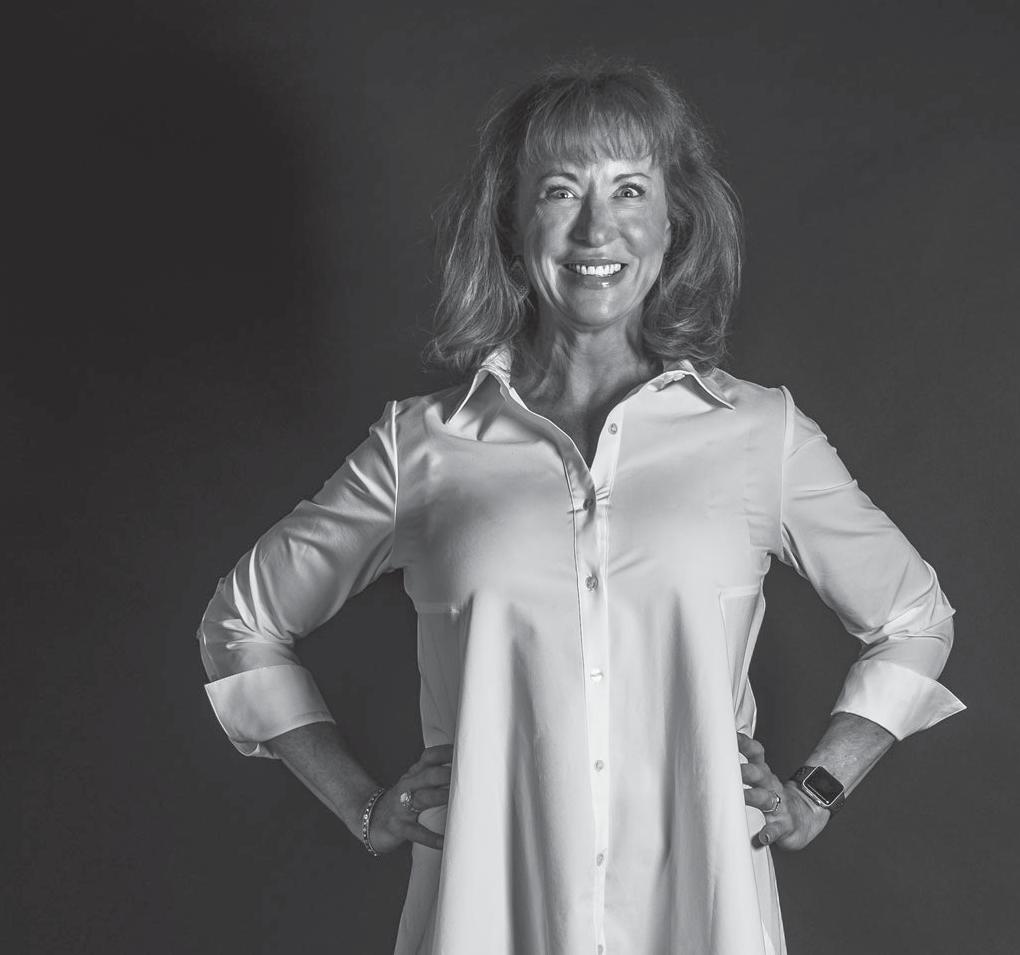

Fort Worth Realtor, an Entrepreneur of Excellence finalist in 2017, invokes an old slogan whenever she hears talk of softening in housing.
BY SCOTT NISHIMURA / PHOTOGRAPHY BY OLAF GROWALD
Mary Margaret Davis likes to recall the buttons she made during the deep recession a decade ago that said “I refuse to participate in a recession” when she hears talk of a softening in housing. “Whether we’re in Texas or Fort Worth as compared to national, I think we’re still thriving,” Davis, a finalist in the
magazine’s 2017 Entrepreneur of Excellence competition, says. “Every year, I’ve done more real estate than the previous year. Things are very stable. There are a lot of new people coming into the market.”
Big pivot: A broker since 1982, Davis sold builder homes for 16 years before she landed a job selling 228 condos in Fort
Worth’s T&P Lofts tower in 2006. “When we sold out, I didn’t have the desire to go back on-site.” From there, Davis developed a niche specializing in urban residential real estate. Her one-woman agency generates $16 million to $20 million in gross sales annually, she says.
Her customer: “It’s very broad. I just sold a girl in her 20s who’s a ballerina. I’m helping an 85-year-old woman scale down from a larger space into a smaller space. And all that strata in between. I [sold] hundreds of homes in the suburbs. It just flowed from there.”
Her typical day and week: setting up closings, paperwork, showings, running open houses, social events, serving on boards and committees. She serves on the Downtown Fort Worth Inc. board, membership committee for the Fort Worth Club, and is Multiple Listing Service co-chair for the Greater Fort Worth Association of Realtors. Davis, a one-woman shop, has been known to close deals while traveling in Greece and Ireland. “I would wake up in the morning, and I’d have a half day where everybody else was asleep.”
What’s next? Davis harbors a dream to help Fort Worth deepen its inventory of urban living choices for aging baby boomers and seniors who are ready to downsize. While the Trinity Terrace and The Stayton serve the luxury senior-living market, there’s little in the way of urban Fort Worth living priced for purchase in the $300,000 to $400,000 range and designed for easy living for aging baby boomers and seniors, Davis says. “There’s a huge hole in the market.” She envisions development along the Trinity River that contains mixes of living options for people at various ages. Current state law that requires condo developers to retain liability for years impedes new construction, she says. Beyond that, “it seems there should be as many marketing dollars serving that market as multifamily.”
Expansion beyond herself? “I like the boutique feel of the way I’ve been doing it. I’ve been contemplating whether I would want to do it differently. So far, my head’s down, and I’ve been working.”


























